#and TEACHERS joking about me and my sister (who was dealing with an arguably more severe undiagnosed disease) missing so many classes
Text
there’s so much i wanna do this week/month/etc but i’m just too sick, i have no energy, i can’t sleep, i’m constantly nauseous and headachey and on the verge of a migraine, i’m stressed and irritable and impatient and panicky…….how tf did i survive nearly 5 years of high school untreated if i can’t even manage this when i don’t have any major obligations rn
#at least i finally got my meds so hopefully i feel a little better soon#although i’m now on 20 pills per day which is Just Great#whenever i’m in remission it’s nice to just. forget sometimes that this can happen at any time#kinda wish i had the typical kinda chronic illness that people talk about with ‘flares’#or at least triggers that i can plan around#the other times have all had an easily identifiable stressor tho tbf. idk what caused this one#the first time was whooping cough and the next few were all very major life stressors like my cat dying right after i started uni#and i think also towards the end of my honours thesis?#but this…….there’s no major stress right now. nothing wildly beyond normal#i’m a little concerned about my joints tho. they’ve been so much worse than normal the last few months#so i’m kinda worried i’m developing rheumatoid arthritis (also an autoimmune disease and it runs in the family specifically)#so if that’s happening then it could set my thyroid off? probably should get to the doctor at some point#obv i’m seeing my endo for thyroid stuff. but i should see my gp and get her to run all the autoimmune blood tests again#i’ve done that before but it’s been a few years and my ankles and knees are so painful i can’t even walk properly a lot of the time#BUT I JUST WANNA DO THINGS I ENJOY AND I CANT AND I WILL CONTINUE TO COMPLAIN ABOUT IT#‘oh you’re so lucky you don’t have as many obligations because you’re chronically ill’ ha ha ha please swap lives with me immediately#personal#but seriously. i wasn’t diagnosed until i was nearly 17 and we can trace it back to whooping cough when i was 12#so it was the last half of year 6 and then all of years 7-10 and the start of year 11 of just being. uh. ‘very lazy and complaining a lot’#and TEACHERS joking about me and my sister (who was dealing with an arguably more severe undiagnosed disease) missing so many classes#wow so funny pdhpe teacher who’s supposed to be teaching is about health#and the thing with being a mentally ill teenager is that hyperthyroidism can just look like a very severe anxiety disorder#so i didn’t go to the dr until i was too sick to go to school at all. and luckily had a good dr who did a blood test#i’m just rambling now because i can’t sleep and i don’t wanna lie here doing nothing#might go play pvz or something. that’s been keeping me entertained
3 notes
·
View notes
Text
Autopsy of Weston Arc
A few days ago I visited a beloved friend @sweetbunny8, and we were bitching about the Boarding School Arc together. That friend is so incredibly smart, she brought up amazing points I never thought about... and so we spent the afternoon facepalming, discussing how many missed potentials there were. The below are the 5 points we talked about, on FIRE🔥🔥🔥!
1. The Arc owes us a thorough Power Dynamic Swap
I think the biggest draw of Kuroshitsuji is the unusual power dynamic between our protagonists. It would have been amazing to see a thoroughly explored power dynamic swap between master and servant.
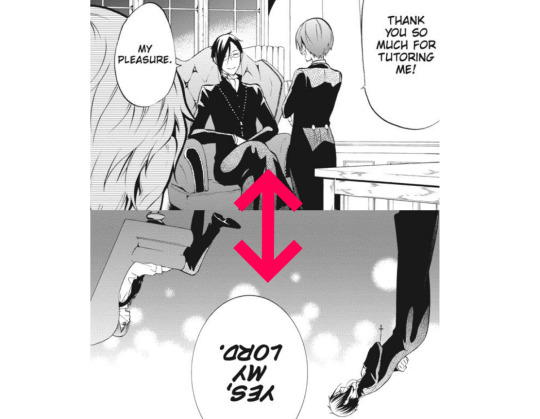
The manga did touch upon this swap, and it gave us a delicious appetiser of what this Arc could have been. I really would love loved to see more of how Sebas and O!Ciel would deal with their cognitive dissonance of role.
Our Ciel
O!Ciel was raised in a world where the roles of servant vs master are very distinct. To O!Ciel it must have been very weird to now suddenly be subordinate to his servant. I would have loved to see if O!Ciel found it uncomfortable, or just really fun to try something new without stakes, or how his habits would slip through. In the Circus Arc we saw very clearly how both Sebas and O!Ciel still succumbed to their habits, thereby accidentally drawing unwanted attention.
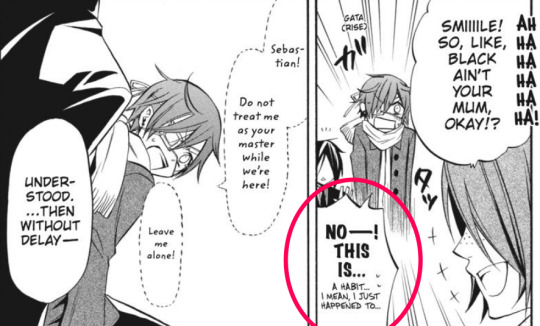
Doing so in the Weston Arc would not have been a carbon copy of the Circus Arc, because unlike at the circus now O!Ciel would be performing in a more familiar environment with people of comparable status. I really wish we could have seen more of that.
Sebastian
Sebas would also have been a blast to see in a likely unprecedented role for him. In this post I argued how Sebas was probably never given opportunity to interact for real with humans on close proximity, and how he was probably not ever considered more than a mass-destruction weapon. It would have been very interesting to see how Sebas would handle suddenly being surrounded by people who don’t just interact, but are also subordinate to him as a teacher!
I find it unlikely Sebas ever had the experience of playing a superiour role to his own master. Sebas loves testing his limits with his master, and it would have been a blessing to see how Sebas could now “legally” exploit his own position of power over his master. I’m sure he would have gotten a kink out of it.
2. Planning and Calculation???
It would have been logical and responsible if the Queen just told her Watchdog what House Derek was in for O!Ciel to investigate. A “P.S. He’s in Red House according to the latest information btw, loves - Vicky” would not be too much asked. She knows Derek’s parents, and I can’t imagine the March of Arden being secretive about what House the kid is in. But even if Victoria didn’t do the efficient thing, we still would have loved it if O!Ciel had to discuss with Sebas and strategically choose a House to get into, rather than him just being planted in Blue House.
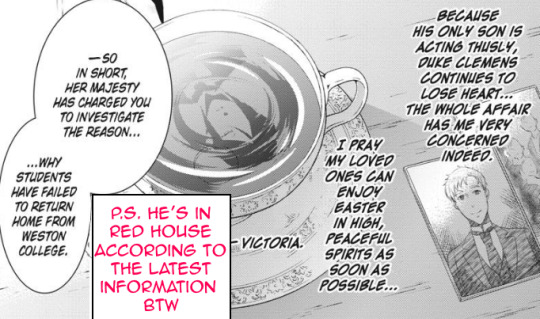
My friend thought O!Ciel would have chosen Red House regardless of whether he knew for sure where he’d be, because as the nephew of the Queen, Derek being in Red was the most logical. As an actual Lorded Earl himself, O!Ciel would have a decent chance holding down a position in Red House. And considering how Redmond has a talent for choosing awful personalities for fag, O!Ciel would have fit in perfectly too!
Then O!Ciel’s goal could still have been to become a prefect’s fag, but then the showdown with Maurice would at least have direct, immediate conflict, rather than... whatever it was the manga did. Maurice had NO reason to neutralise O!Ciel as long as they’re in different Houses! Maurice you... boring, inefficient, redundant twat...
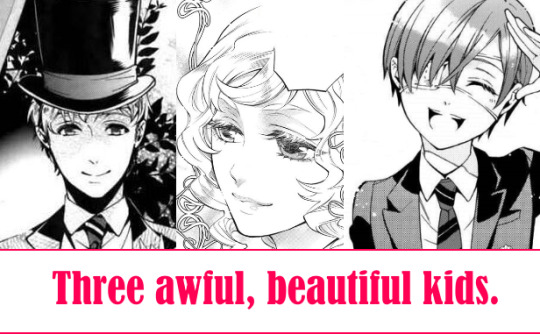
3. Yana... is Edward a joke to you?
Why didn’t O!Ciel/Yana capitalise more on Edward being at Weston?! It would have been a perfect chance to develop Edward further and show O!Ciel’s interaction with family! I love Lizzie, but it would have been amazing to see Edward interacting with our protagonist without his sister being the reason for interaction. UGH 💔
Also, the cricket drag could have been shortened dramatically if O!Ciel had thought of using Edward. Edward has been at the Weston for longer, and he is a prefect’s fag to boot.
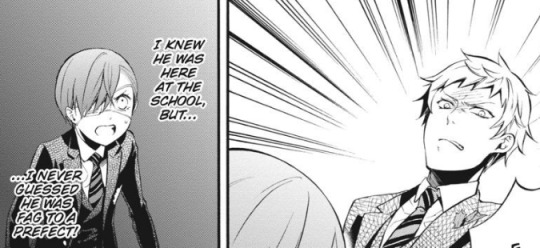
Sure, O!Ciel didn’t know that at first, but he finds out BEFORE the cricket was set up. The moment O!Ciel would learn that he’d need to win cricket to meet the principal, he should have gambled on Edward. If O!Ciel explained to Edward that he is investigating the disappearance of the Queen’s relative, I can’t imagine Edward not being willing to help by winning cricket in becoming “the chosen one” through gentlemanly play. That’d be what Edward would be aspiring to become, anyway.
4. Why Cricket ANYWAY!?
Even IF Edward for some reason refused to help, the cricket would still entirely have been unnecessary. It wouldn’t matter at all who would win, because as the prefect’s fag, Edward had the privilege to attend the Midnight Tea Party ANYWAY. All four prefect fags are present, as we all can see. O!Ciel would only have needed to ask Edward to act as his agent, and tadaaa.
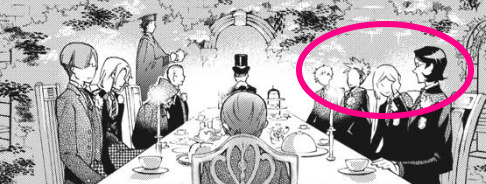
Besides, even IF Edward didn’t exist in the arc it’d still be entirely fine, because all the prefects would SURELY have access to the Party. That is known. O!Ciel only needed to tell Sebas to keep an eye on where the definitive participants would be going, and track them. When push comes to shove, Sebas could just barge in like he did anyway (and bring O!Ciel even if he’s uninvited), and the case would still have unfolded the way it did.
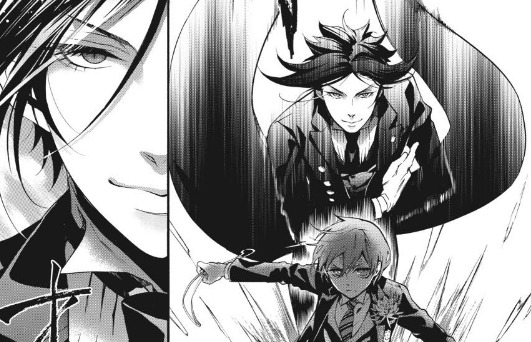
5. PLOT HOLE!?
My friend also brought up a humongous plot hole so large it became a space on its own that I didn’t even notice it was a hole. Why did the prefects react so differently to Agares and Derek being “alive” respectively?
So, my friend and I both watched the musical adaptation as the last thing, and in the musical the prefects were all being totally chill about Agares being around, but shocked shitless to see Derek back. All four prefects were present during the killing of Derek AND Agares, so they should all know both are dead. It had not been addressed in the musical that the prefects have knowledge of corpse reanimation, so they shouldn’t have been able to act so normal next to Agares, but freak out about seeing Derek. (This is yet another example of WHO IS YOUR TARGET AUDIENCE, KUROMY21!?)
In the manga it had been addressed that the prefects have knowledge that reanimation of the dead is possible. And it seems like Redmond arranged for the reanimation of at least Agares. But why didn’t they arrange for the reanimation of Derek too? (@chibmib Thanks sis, for checking this for me so I didn’t have to suffer through it again)
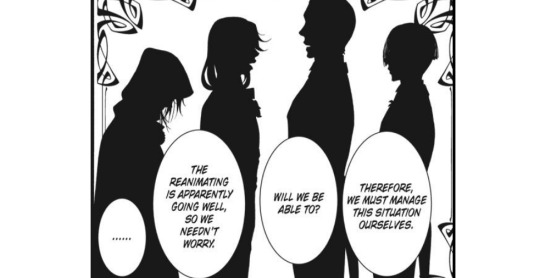
Derek is the Queen’s relative, his disappearance would really have invited suspicion, as it indeed did. The reason the P4 didn’t arrange for Derek’s reanimation can’t be because the they considered Derek too evil to bring back. Agares was namely arguably worse; he was an adult and the vice-principal! It was his literal job to be responsible.
The P4 couldn’t have decided to not reanimate Derek for fear of him ratting them out for assault. There are plenty witnesses of Derek’s crimes, and the P4 would be first-hand witnesses too of Derek’s lying. If Derek told the authorities he was assaulted, all witnesses could have helped testify for the P4 against Derek.
The only reason I can make sense of the double standard in the P4′s reaction is that Undertaker told the P4 he only succeeded in reanimating Agares and not Derek, because the technology is still very young; which would have been true too. BUT THEN THE MANGA SHOULD HAVE ADDRESSED IT.
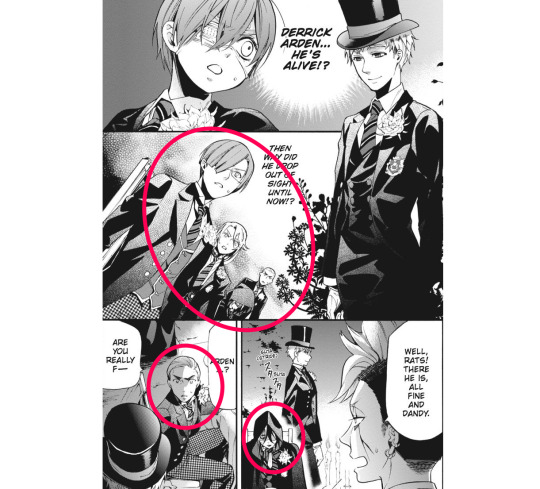
Even if that’s what happened though, the P4′s reaction shouldn’t have been such horrified surprise. They should be relieved to see the Queen’s relative alive, because then they wouldn’t have ‘murder of Queen’s relative’ on their résumé. All they had to do instead then is explain why they attacked Derek in a moment of lost control at the sight of a future-prefect being a lowlife. And again, the victims could have helped testify...
And this all would only have happened if we momentarily accept the unlikeliness of Sebas coincidentally having a plugged nose and not smelling Agares’ corpse stench the entire Arc.
#Boarding School Arc#Weston Arc#Kuro Potter Arc#Autopsy#Analysis#I really hate this arc so much#and after talking with that friend about the amazing potentials that was just missed...#I mourn those potentials
76 notes
·
View notes
Text
Top 10 Thanksgiving Episodes
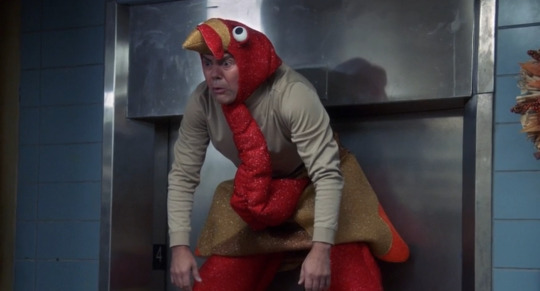
Happy Thanksgiving Everybody! Time to eat a ton, pass out, and watch MST3K and all that. And since I already covered most of the general stuff about how diffrent this holiday is in my Loud House Review, and to reitarate to anyone having a big, 20 or so people crammed in a room thanksgiving this year
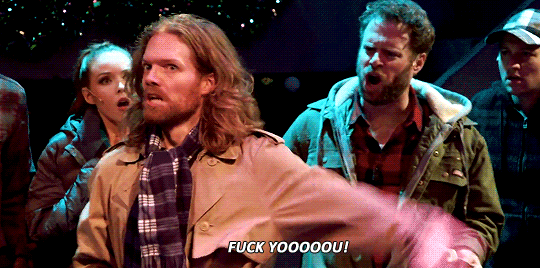
For the rest of us like all of the big three of Holidays, thanksgivings also the time for some classic episodes of television. Granted most shows stick to one, with some exceptions like friends, roseanne and new girl, but most make their one count. Thanksgiving may not be as big as the holidays it’s sandwitched in between, to the point christmas is slowly but surely trying to swallow it whole, but it’s still a time for family, fighting, and food that brings plenty of opprotunity for greatness and even with a smaller pool, I stiill had signifigant trouble narrowing down my list to 10. But I stand by what I got it wittled down to. This is my top 10 thanksgiving episodes! And for my regular readers, there’s a suprising lack of animation but i’m more than willing ot go outside that and now’s the right time, asi’m currently having a black friday sale with reviews marked down by two bucks to just 3 dollars for an episode of any tv show. Yes it’s a shameless plug but since when have I ever had shame? So with that in mind let’s chow down, it’s my top 10 thanksgiving episodes!
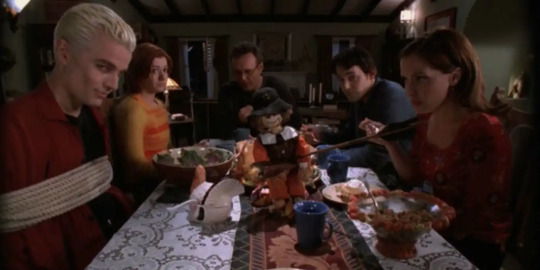
10. Pangs (Buffy the Vampire Slayer)
Buffy is as a show I REALLY need to revisit. While lately, what with the abuse he did that we can’t get details on when making justice league or his you know cheating on his wife on and off over a decade, I’m not at all a fan of series creator Joss Whedon, Buffy itself is still a classic in my eyes.
The tale of a teenager given the role of the Slayer, a chosen female asskicker given moderate super powers and the duty to defend the world from vampires and other ghouls. The show dealt with the usual teen superhero stuff, ballancing asskicking with saving the world and arguably codified the genre, to the point I hold it at least partially responsible for the bigger wave of teen heroes in the 2000′s in animation and comics. The show had smart dialouge, metaphors, mythology and a rich, and vibrant cast. Sure some things haven’t aged well like an adult vampire dating a teenager or the really dated ways Willow’s sexuality were handled, as groundbreaking as it was, from barely letting her kiss her girlfriend or be shown being intimate iwth her, or just entirley shutting out the posiblity she’s bisexual. But a few age wrinkles aside the show is still good and I still need to rewatch it and that includes our number 10 pangs, one of hte most memorable and well done thanksgiving specials and one fo the shows more comedy moments.
It’s thanksgiving, and Buffys mom’s going out of town, so she decides to hold thanksgiving at Giles place to bring her slowly drifting surrogate family together. Naturally given the way things usually go for our Slayer, she has a hard time of it as Willow chafes at celebrating colonolsim, Giles dosen’t get what the big fuss is about that or the meal being british, and Spike shows up looking for protection from season big bads the initiative, a secret military unit that’s chipped him so he can’t harm humans, so he has no way to eat and spends the mal tied to a chair. Oh and of course, a vengeful native american spriti from the chumash tribe has given Xander syphilis and killed a currator as revenge for his people’s suffering, so now Buffy has to fight a ghost bear if she want sa happy thanksgiving. Also Angel is back in town and being kind of a dick, but hey it leads to a good episode of his spinoff so whatever.
Pangs is just a fun episode, not only does it do well by not ignoring american colonalisim, but it just has a fun energy to it as Buffy desperately tries to have a good thanksgiving, Spike instnatly proves his worth as an addition to the gang both chemstiry and comedy wise, and we of course get this classic moment.
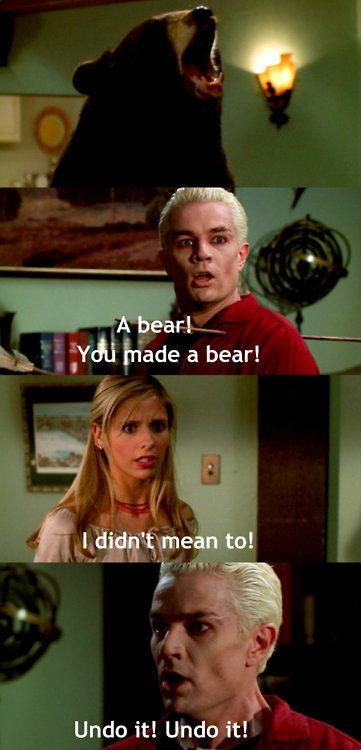
It had to fight it’s way onto the list, but pangs is a holiday dish worthy of sinking your fangs into.
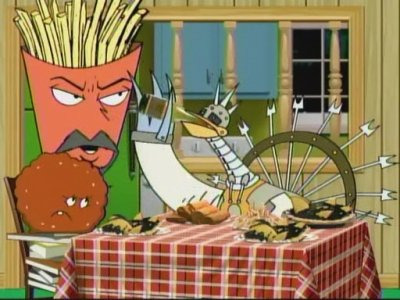
9. The Dressing (Aqua Teen Hunger Force)
Speaking of nutty fun thanksgiving episodes.. this one is simply that. I love Aqua Teen Hunger force.. even if like a lot of comedy shows it drooped in later seasons, it still has it’s classics earlier on and even later on has a few gems. But on the earlier on side we have their utterly bonkers and delightful thanksgiving episode “The Dressing”, a sequel to the Christmas Episode “The Cybernetic Ghost of Christmas Past from The Future”, which itself is an utter classic, but we’ll possibly get to that in december’s list.
The Aqua Teens are having Thanksgiving with Carl, whose naturally onlyt here for the free food and staying outside. it’s also days before or after, with black colored frito pie,a t urkey, and whatever else their broke selves could scrounge up.
However, naturally, like Buffy a normal day for the Aqua Teens just isn’t complete without some weird shit happening, thanksgiving gets interrupted by the cybernetic ghost of Christmas past fromt he future, whose transformed himself into a turkey and wants to save their turkey so it can lead a rebellion in the bizzare hilarious distopian hellscape he comes from. This of course leads to him getting drunk, eating all their food and later showing up with a laser sock to murder carl after the episodes over. It’s just a fun time, a really funny episode and one of the teens more memorable outings. Not a lot to say here, it’s just really damn funny.
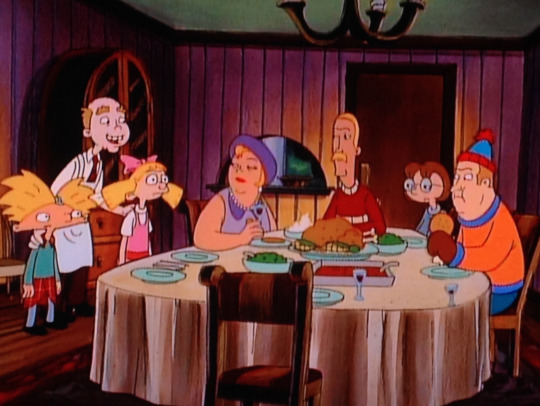
8. Arnold’s Thanksgiving (Hey Arnold!)
Anoter classic I really need to revist but that more than earns his place here. Hey Arnold.. is easily one of the best animated shows ever. I say that with no hyperbole as it handled slice of life well while still getting dramatic when needed to, and is easily the gold standard for slice of life children’s cartoons to this day. And naturally it’s holiday specials were great, and I only r eally haven’t revisited them because they also hurt.. a lot. So unsuprisingly this one makes the list.
IT’s thanksgiving and given how chaotic things are for both Arnold and Helga’s families, our heroes are miserable. Arnold would understandably like just once to have thanksgiving on thanksgiving, his family instead doing fourth of july due to his grandmother being who she is. And Helga naturally is ignored and mistrteated as usual since her sisters home and her dad and alchoholic mother ignore her as usual even when she’s not around. What i’m saying is while Arnold’s issue is understandable, helga always wins a “whose got the shitter life” contest.
So the two flee to their teacher Mr Simmons, a character I genuinely loved and loved even more finding out he was gay as an adult, as he was a kind , supportive teacher who could be a bit softhearted but wasn’t afraid to step the fuck up when needed. But they find his thanksgiving isn’t much better, as his Mother and wont’ stop sniping at his boyfriend peter and clearly isn’t entirely comfortable with her son’s sexuality, his friend keeps snapping at peter and mooching off him, and his uncle.. well he’s just a loud asshole who wants turkey.. The kids naturally realize the meaning of the holiday, reconclie with their families who DID take genuine steps to make up for them being gone and missed them, all is well. It just shows nobody’s family is perfect, and is well done in that but also shows why thanksgiving has grown beyond it’s roots: It’s a day for families to get together and even if they may fight, recognize why they love one another. I also give the show balls for heavily imiplying a character is gay and not slapping a girlfriend on him or any of the usual bollocks: Simmons just very clearly is gay and it’s as transparent as the show could get at the time, with the show making it crystal clear years later with the revivial movie. Nice. We’ll have more servings of thanksgiving classics after the cut.
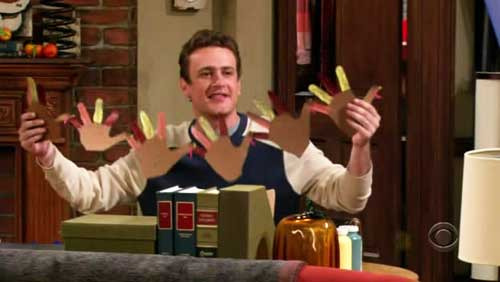
7. Slapsgiving (How I Met Your Mother)
Oh How I Met Your Mother. You started out really good but boy did that go downhill fast and land in a nuclear inferno didn’t it? But I can bitch about the How I Met Your Mother Ending some other time, and probably will. In the show’s prime before they decided to stick with an ending no one wanted anymore, it was pretty great and while season 1′s also impressive Thanksgiving outing “Belly Full of Turkey” was considered, there was ultimately one slaptastic king when it came to Thanksgiving: Slapsgiving.
Naturally for this show Slapsgiving ties into the show’s suprisngly deep and rich lore: The season before this, Marshall and Barney made a “Slap Bet”, which is exactly what it says on the tin: A bet where the winner slaps the looser. And due to Barney prematurely slapping Marshall, Marshall got 5 penalty slaps to be dolled out whenever, one in that episode and another in a coda to another. For his next one though Marshall decided to outdo himself and set up a counter.. and it all comes down to thanskgiving.
So we get a good ten minutes of Jason Siegel making meancing slap based refrences while NPH’s barney cowers in fear before Marshall’s wife lily pumps the breaks on the bet as comissoner.. only to reconsider when Barney makes the mistake of tormenting Marshall over it, resuling in the inevitible, and in THE thanksgiving song.
youtube
Basically it’s what happen when you give three really funny people a subplot together. Magic happens. The subplot is not bad either as a pre-totallyinsufferabledouchebag Ted hooks up with Robin again over lingering feelings and thanksgiving prep and the two have to deal with that... though it’s mostly funny for Robin’s new boyfriend, who Future Ted acknowledges is barely older than them, but admits to remembering as decrept old man, which results in a 30 something’s dialouge coming out of a very old man and me laughing very hard. A simple joke but one that really works. Overall a slaptacular good time.
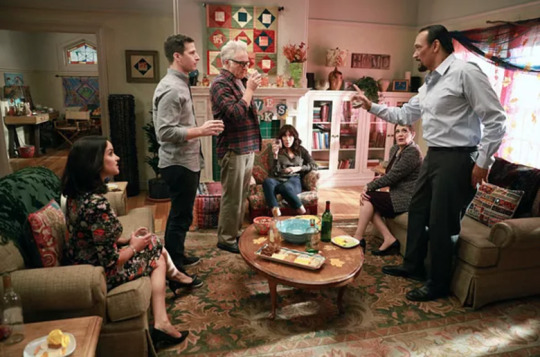
6. Two Turkeys (Brooklyn Nine-Nine)
NINE NINE BITCHES! I’m honestly shocked I haven’t talked about Brooklyn Nine Nine on here already, but it’s easily one of the best sitcoms in recent memory, if not of all time. It has one of the best ensemble casts, great jokes and timing, yet still ballances things out with a sense of realisim beneath the madness> It’s also noticable for holding it’s officers more accountable than most real world police departments, to the point all scripts that were written up for next season were thrown out post George Floyd. It’s truly a joy to watch.
So naturally they’ve had their share of Holiday episodes, with them easily having the best crop of halloween episodes since roseanne with their annual heists, and having some pretty damn memorable christmases, opening with this:
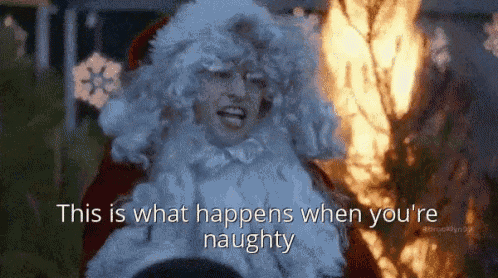
So naturally thanksgiving is no exception, with it’s last two being the best and it being a really hard choice wether to go with season 4′s “Detective Santiago” or this one. But as good as the other ep was.. this one inched it out for good reason.
The episode’s split into two equally good, equally hilarious plot lines. In the B-Plot, the 99′s Captain Raymond Holt, one of the best characters in sitcom history and gay icon, and his husband Kevin take their annual trip to get a pie for Holt’s families thanksgiving and come back with the well crafted pie, even if both prefer their food nice and bland. But the pie go missing and Captain Holt procedes to hilariously drill into each of the other members of the 99 and uncovering holes int their previous thanksgving stories with Rosa’s being suprisingly heartwarming (She’s going to a humilating minons on ice show with her family because they reconnected in jail.. setting up the equally awesome “Game Night” episode where she comes out.) and Boyle’s being utterly pathetic as you’d expect (Cooking his son mac and cheese because he’ll eat nothing else and declaring him a “basic bitch”). The solution however ends up being heartwarming as the culprit is actually Kevin, who hated the pie.. as did Raymond who suggests just taking the drive anyway because they enjoy the silent ride there and back every year. It may be boring to us.. but it’s preicious and really sweet all the same.. as it is hilarous when Kevin treats this as a big endugence and seems turned on by that. What i’m saying is these men are couple goals and Marc Evan Jakcson was awesome long before ducktlaes.
The main plot is also great, as Jake and Amy, now engaged after this year’s halloween episode which is also , coincidentally, the series best, try to unite their families. It just goes about as well as you’d expect as Amy’s are type a control freaks, jake’s mom is a retired hippie school teacher and his dad is a human disaster area who has to be told to put on pants, cheated on his mom constantly, somehow got her back, and in general is barely functional on a good day. The families do bond breifly but things ineveitbly break down, hilarity and severed limbs insue and family comes together. IT’s just a funny, well done 20 mintues that’s also really damn sweet, with this plot ending with Amy’s dad accepting the chaos as that’s’ts what you do with family. Also jake naturally finds out he has a ton of step siblings as his dad was and still is a man whore. Happy Thanksgiving!
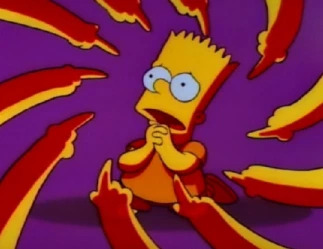
5. Bart Vs Thanksgiving (The SImpsons)
Let’s face it: if you follow my reviews at all you knew this was coming. While not one I go back to due to being an emotional kidney punch, i’d be doing this list a diservice if this classic wasn’t on there.
In a nutshell, Bart starts a petty fight with Lisa over her centerpiece that ends with it in the fireplace, Bart sent to his room till he apologizes, and Bart seething insiting he did no wrong. It takes a visit to the homeless shelter after running away, and ending up on the news, to realize what an ass he’s been and one nightmarish dream sequence later, seriously why do you think I don’t revisit this one that often? This thing has traumatized me since I was a kid and unlike the slap song I will not be showing it to you, has a heartwarming reconcliation with his sister on the roof. It’s just a nice, sweet special that gets the holiday just right and i’d expect nothing less from Golden Age Simpsons.
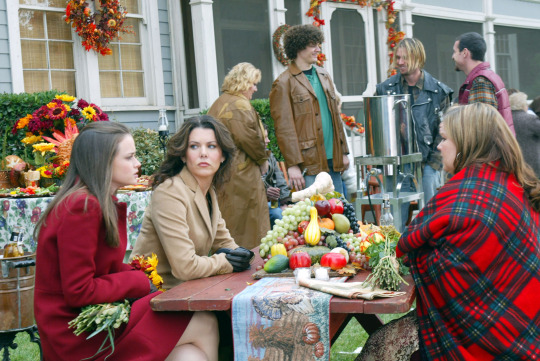
4. A Deep Fried Korean Thanksgiving (Gilmore Girls)
Another show I need to talk about more, Gilmore Girls is fucking awesome. The story of a woman who ran away pregnant at age 16 and built her own life for her daughter in the quirky town of stars hollow who finds herself reconnecting with her parents in present day against her will.. is really good stuff. Funny, heartfelt and really damn well acted with one hell of a cast, the show is part of me and I make no bones about that, so it’s big thanksgiving outing naturally belongs on here.
The premise is simple: Rory and Loreli end up having to go to four diffrent thanksgivings, which even for big eaters like them is a massive task, each unique and entertaining. The main event of course is Suki’s, where everyone’s faviorite chef agreed to let her husband cook the turkey.. of course with the plan to sneak in mid cooking and add her own touches. This gets foiled when Jackson and his family decide to deep fry the thing.. probably in part because Jackson knows his wife well and knows what she was planning. Though over the night while our heroines are at their other meals, it devolves into them deepfrying everything they can get their hand son including a shoe, and Suki getting plastered to tolerate it.
While not topping it the other meals and the sheer lunacy of four thanksigvings in one day, are still memorable: There’s the natural posh one at Richards and Emilys, the dour joyless one at The Kims where Mrs Kim forces the band to play the whole time and forces our heroines to eat food as joyless as Mrs. Kim, and Lukes for a nice round of Rory grappling with having PDA with her boyfirend Jess before resolving it at the end. Also dean’s a jackass. No one is suprised. Jess isn’t one at this stage in his character which is. Also Kirk adopts a cat that slowly pushes him out of his own house which works comedically becaus Sean Gunn is a national treasure. Overall a really good episode and if you have netflix and haven’t checked the series out, this is a good one to try out.
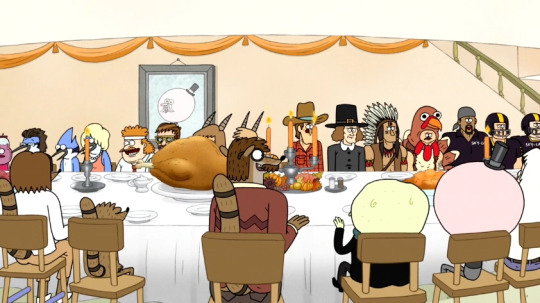
3. The Thanksgiving Special (Regular Show)
I already talked about this one in my top 11 Regular Show episodes so i’ll try to be brief. In a nutshell Mordecai and Rigby destroy thanksgiving and genuinelly feeling bad about it, scramble to win a thanksgiving bird from a Thanksgiving Song Contest, going up against an all star super group comissioned by Donald Trump. Yes really. Meanwhile Muscle Man and High Five Ghost go to get sides and the rest of the park staff’s attemtps to get a turkey are thwarted by a bunch of thanksgiving reinactors who go unexplained in any way shape or form which given how rare that is for regular show, which usually has some sort of explination for the madness, just makes it funnier. It ends with a REALLY touching song, a fight on a blimp with outgoing president trump, and a truly heartwarming thanksgiving meal. All in all a nice special that combines the shows madcap nature with the genuine warm fuzzies of thanksgiving.
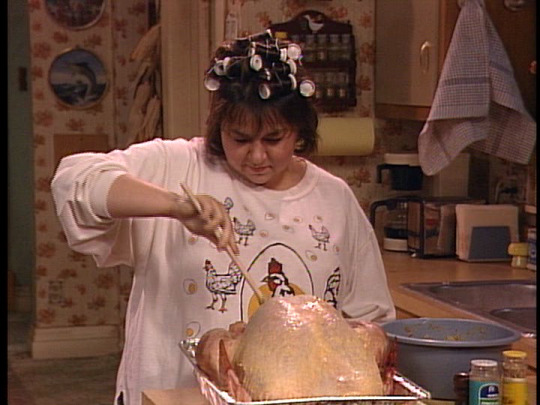
2. We Gather Together (Roseanne)
Another series I need to talk about more.. and another series where one of the creators has turned out to be a terrible human being. Seriously Roseanne Barr is is a terible person, she deserved to be removed from her show, and while the Conner’s isn’t GREAT it’s still FAR better without her. That being said I will still stick up for the original as she wasn’t the only one involved (indeed the aformentioned Joss Whedon worked on the show breifly and Gilmore Girls creator Amy Sherman Paladino not only worked there but later adapted one of Roseanne’s insane antics, making all the writers wear caps with a number instead of referring to them by name , to Gilmore Girls.). Her being a bad person even then dosen’t change the fact that the show is sitcom gold, one of my faviorite shows, and a true classic. And this episode helps showcase WHY.
What makes this episode special, even among Roseanne episodes is it’s structure: While there are things going on it’s mostly a free floating day in the Families life and thus feels like your there with them through thanksgiving. It feels genuine, like past thanksgivings i’ve remembered: Everyone has their own stuff going on, they all eat, and there’s naturally a big blowup.. and one that eveyrone else ignores to eat which I can relate to. That authenticity really elevates the episode and is why I seek it out every year.
That’s not to say nothing happens, it just flows in and out like it would in a normal thanksgiving. Roseanne deals with her parents, a pre-abuser version of her dad and her overbearing nightmare of a mother beverly, and the inevetible blow up when Bev’s needling about Jackie’s life goes too far , prompting Jackie to reveal her new job as a police officer before bursting into tears, all to Roseanne’s annoyance. Rosie also moves them to a hotel despite an attempted guilt trip from her mom.
Speaking of Mom’s we see Dan’s for the only time before the later seasons and the utterly terrible last season, a professional career woman whose moved on well from her ex and brought her new boyfriend there. Ed, despite some comptemplation over it is firmly accepting and instead starts flirting with the Conner’s friend Crystal. Dan, being overprotective because of his Daddy Issues, but ed cals him out on it “Being lonely is a hell of a lot for two people to have in common, you woudln’t knwo anything abotu that son, and I pray to god you never do” A great caper to a fantastic episode.. one I thought was going to top the list... THOUGHT is the key word here...
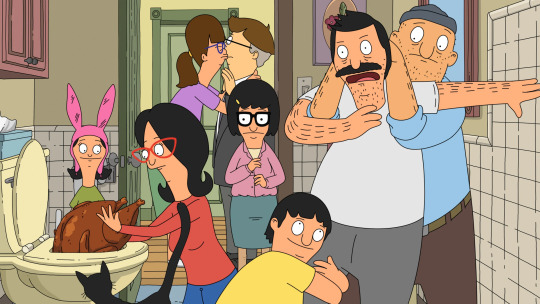
1. Turkey in A Can (Bob’s Burgers)
This one is. Bob’s Burgers is one of the best things to come out of the 2010′s and i’ve fallen way too far behind on it, so I can’t say if any thanksgivings after thankshoarding top this one.. what I can say is this one is the gold standard for thanksgiving episodes, and is filled with great stuffing.
Thanksgiving is Bob’s holiday. Being a chef he loves the chance to go all out, and really flex his muscles for his families when it comes to cooking up a storm, and it’s endearing when bob gets just as nuts as his family. But this year someone keeps flushing his turkeys down the toilet despite his best efforts, so while Louise hilariously tries to solve things to proe it wasn’t her (though it’s entirely fair they thought it was her consdering.. everything), while LInda, Gene and LInda’s flighty sister Gale try to write THE thanksgiving song. And while it’s no you just got slapped, damn if they didn’t succeed.
youtube
Sailors in your mouth indeed. It leads to plenty of great jokes the best being the guy at the Deli Counter thinking Bob’s into him and bob not being sure how to respond, but being mildly recpetive. But the climax is what makes the episode as when Bob falls asleep we find his medication has been making him sleepwalk.. and thus put the turkey s int he toilet, as Tina’s desire to be at the Grown Up Table, itslef a REALLY funny runner as you’d expect, has him panicking internally and thus reliving her potty training. The episode ends with Bob letting her come to the adults table, and a rather heartwarming thanksgiving feast. All in all an excellent episode. It also leads to the chaos seen above whic hif htat’s not thanksgiving, I don’t know what is.
Have a happy thanksgiving and check out my black friday sale! Until then there’s always another rainbow!
#thanksgiving#top 10#bob's burgers#gilmore girls#buffy the vampire slayer#aqua teen hunger force#hey arnold#how I met your mother#the simpsons#roseanne#regular show#brooklyn nine nine#brooklyn 99#99
13 notes
·
View notes
Text
Qrow as Ruby’s Dad
I am fully aware of the ugly can of worms I am opening just by discussing this but whatever. Here we go.
Just a disclaimer, I mean no disrespect to Monty, Miles or Kerry. I am simply stating the possibility and leaving all options on the table.
The idea of Qrow being Ruby’s biological father has been around since Qrow was introduced back in Volume 3. And although it’s been shot down by the creator and current writers of the show, I’m going to go over as much I can to show that the theory/headcanon still has some level of validity.
This is also pretty long so brace yourself.
Point #1: The Writers
Monty originally “debunked” this theory while dismissing another by saying Yang and Ruby were half-sisters. And recently it was debunked again by Miles, who outright said Qrow wasn’t her dad. The word of the Writer’s is, under most circumstances, Law. But let me say this: What is the one thing you are supposed to do above all else? Preserving your narrative, meaning doing everything you can to protect your plot.
Many writers have concealed or just lied to their audience about certain plot points to maintain the story. And just because Monty, Miles and Kerry don’t seem like they would, doesn’t mean they aren’t capable of it.
Why would Monty lie? Because Ruby and Yang being sisters was what he had presented at the time. Qrow was only a name at the time, so revealing so detrimental so soon wouldn’t make any sense for the show’s longevity. Thus, he kept his lips sealed.
Now there’s Miles; why would he outright deny this theory. Well, if I had to guess, it would be to quell the speculation, to stop people from outwardly talking about it. Has he succeeded? For the most part, yes. Fans and Haters alike have stopped discussing it en mass, but it hasn’t stopped fanfic writers and artists much.
While debunking this theory, Miles gave his reasoning to be “Ruby just admires him so much that she mimics a lot of what Qrow does.”.
Let’s unpack that for a moment.
What about Ruby’s character is reminiscent of Qrow? Ruby is, by all accounts, opposite to Qrow in many facets of her personality. She overwhelmingly optimistic, despite witnessing the deaths of Penny and Pyrrha. She’s open and honest, though a bit naive and socially awkward, but after all she’s still a teenager. Qrow, from the few accounts we know of, is actually pretty suave and quite the ladies man too.
Basically, anything Ruby is, Qrow is not. The only real thing that statement applies too, is her love of her scythe, but even then that argument is flimsy. As an impressionable young girl with a passion for weapons/huntsman, and then seeing her uncle wielding the coolest weapon in entire show; I mean who wouldn’t want a scythe at that point.
Point #2: Appearance
First and foremost, the most obvious thing people tend to bring up; Ruby’s appearance. In current canon, Taiyang is Ruby’s father, but you’d never be able to tell as they share absolutely no physical traits or attributes. Already a bit strange, no? Now I get Ruby is SUPPOSED to be a near spitting image of her mom, Summer Rose, but to no share anything with Tai is a bit of stretch.
Then there’s Yang in stark (hehe) contrast; who is a near even split of her parents. She has Raven’s long bushy hair, is taller than most other girls, has Raven’s general shape of face and paler skin, but is blonde and has lilac eyes; a combination of Raven’s red eyes and Tai’s blue eyes (even though that isn’t how genetics works but whatever). Even Yang’s outfits have been greatly inspired by Tai’s in terms of colour palette and design.
Even comparing other characters within RWBY, such as Weiss, Blake or Ren, have a striking resemblance to both their parents/siblings. So for Ruby to not designed in a similar fashion is odd to say the least. Ruby isn’t exactly identical to Qrow by means, she stills shares a great deal more with Qrow than we’ve ever seen with Taiyang.
Qrow is also a fraternal twin. Or in other words, Ruby is also liable to look like Raven too. Male and Female character models are different looking in RWBY, so it’s reasonable to think to Ruby would share some traits with her could-be aunt.
Ruby’s current overall aesthetic has subtle cues from both Qrow and Summer. Dark but red tipped hair, her mother’s eyes and a near identical outfit. Ruby’s cloak is red and tattered like Qrow’s, but large and hooded like Summer’s. Her aura is red, but generates flower petals when she uses her semblance. Ruby even had Cross as her emblem, until it was changed to be the same as her mom’s. But even still, she had cross pins in her cloak till her outfit change in Volume 4. Only one character shares this cross motif, and it’s you guessed it, Qrow.
One minor thing is that Ruby’s alternative outfit in Volume 2, dubbed Slayer, gives her a noticeably large resemblance to Qrow; even more so than her current or former outfits.
I’m very aware that any of this could be just simple coincidence and random choices in design but let me say this. Colour is an underlying basis for RWBY, and it plays a semi essential role in the show’s lore. So for it’s main protagonist’s colour pallette have next to nothing to do with her actual parent, but share parallels and such to someone she has no genetic relation to is, to me, unbelievably suspect. If Ruby was a strawberry blonde or even a bit tanned, we wouldn’t be even having this discussion, but given everything we know, it just doesn’t add up.
I’ve seen a handful of people say that it doesn’t matter that Ruby doesn’t look like Taiyang or It’s okay because not all children look like both parents. Well that may be true in reality, but in RWBY, this is contrary to the underlying theme of the show.
Point #3: Ruby’s Mentor
Let’s look at Ruby’s phenomenal skill with the scythe. As we well know, Qrow was her mentor and taught her most of her current fighting skills. However, this begs the question of why Qrow taught her and not Taiyang. Taiyang is incredibly skilled at hand to hand combat and is evidently a good teacher, as he trained Yang and currently still is a professor/licensed huntsman.
So why is Ruby so utterly abysmal without Crescent Rose? Since she’s Tai’s daughter, you’d think she’d be at least somewhat talented like Yang but such isn’t the case here. Why would Taiyang heavily train Yang, but leave Ruby practically defenseless (given her dream of being a huntress too)? Seems a bit strange no matter how you look at it.
However. There is something I noticed about Qrow. We know and seen how badass he is with Harbinger in tow; his skills are nothing to scoff at. Many in the RWBY universe are aware of Qrow’s prowess and would prefer to not engage him at all. But when Harbinger was wretched from his hand during his fight with Tyrian, he showed that he is capable without his weapon.
The thing that’s intriguing is he looked very rigid and doesn’t seem too confident without his scythe, especially comparing him to hand-to-hand combatants like Yang or Mercury. It felt like it was just a ‘screw it’ moment so to speak. A weird thing to point out, I know, but it creates another parallel between him and Ruby. Masters of the scythe that don’t fare too well without it.
Point #4: Ruby’s Name
A small thing to point is why Ruby has her surname as Rose. Ruby Xiao Long doesn’t flow off the tongue by any stretch, but there must be some other reason why she hasn’t taken Tai’s last name. Is it to honour Summer? Or is it because she isn’t a Xiao Long at all?
Now a point I don’t love but must mention is the line from Qrow’s theme song Bad Luck Charm.
The line in question is “You don’t want the burden of my name”. Many believe it is Qrow referring to Ruby and how she’s better not being known as a Branwen. As Qrow mentioned, his tribe is a group of “killers and thieves” and likely didn’t want a innocent child to be associated with such a group. There’s a chance it could mean he deliberately convinced Summer to let Ruby have her name, to protect her from the Tribe’s retribution. If Ruby was a Branwen on top of being a SEW, it would likely make her a target for not only Salem’s forces but bounty hunters too. (Going after Ruby to punish the “Traitor” so to speak)
Point #5: Qrow’s Semblance
An argument against Qrow being Ruby’s Dad is that it doesn’t make sense to hide the truth from her but then teach her the most difficult weapon to master in Remnant. While at first glance, this is a fair argument, but let me dive a bit deeper.
In Episode 8 of Volume 4, we learned that Qrow’s semblance is Misfortune. It intermittently causes bad luck to every person around him, from simple inconveniences like a bartender dropping a glass to life threatening things like a massive beam almost falling on Ruby. This gives him a logical reason for his loner persona.
He can’t control what will and can happen to his friends, his allies, or his family. He is, much to his own grief, a constant danger to those he loves. Why does this matter? Because he’d be Ruby’s only remaining parent; meaning she’d always want to be with him, ironically putting herself in more danger. He’d keep the truth from her until she was hopefully old to understand why he kept it from her.
Qrow was also a former Professor at Signal Academy. Though most of the details of his career as a teacher are sadly unknown, It can be at least gathered his semblance wasn’t potent enough to cause too much trouble on campus or he’d have never been allowed as a teacher in the first place (perhaps it’s less effective in crowds?).
Now Qrow likely would have trained Ruby in a controlled environment to ensure his semblance would cause as little damage as possible. Qrow and Ruby are arguably the two closest characters in the series as far as we know and they have been shown to be this way. They understand each other, know each other’s mannerisms and Ruby even gets Qrow pervy jokes. So it’s no shock to think Qrow knew much she idolized the hunter lifestyle and helped her live out her dream, all the while getting to spend time with his baby girl.
Point #6: The Timeline
Another thing many have taken note of is the amount of time it took Taiyang to father both Yang and Ruby. The math is a bit difficult as we don’t know Yang’s birthday, but let’s get an estimate.
As of Volume 6, Yang is about 19 and Ruby is about 17.
Ruby’s birthday is October 31st, so she was conceived near the end of January or early February. Yang was likely already around 15 months (give or take) at the time of Ruby’s conception. In short, Taiyang would have had Yang, been abandoned by Raven, gotten together with Summer and impregnated her in little more than a year. A situation like this is not impossible, but it is extremely unlikely.
Getting over a significant other varies per person, but given how Tai talks about Raven; it doesn’t seem like their relationship has run its course quite yet. Summer was most likely helping Tai because he genuinely needed it. Dealing with a newborn and the fact his lover just left him alone, Tai wasn’t exactly in the best state of mind.
In “Two steps forward and two steps back”, Tai finally opens up to Yang about her mother. The way he speaks about Raven feels as though he still fondly remembers her, despite her leaving so abruptly. It feels as if he still loves her, but if that’s the case, why would he shack up with Summer and have another child so quickly? Anyway you slice it, this is a pretty irresponsible thing to do.
UNLESS, Taiyang was never a part of the equation and Summer and Qrow were together the entire time.
Another thing people tend to point is why Qrow would have Ruby believe Taiyang was her father and Yang her sister. Simple, he didn’t want her to feel isolated. Her mom was gone, and he couldn’t there for her. Children can be cruel, and Ruby not having a dad around would definitely be fuel for any and all types of bullying. Making Ruby and Yang “sisters” would have been made things simple; Qrow was already Yang’s Uncle so why not Ruby’s too.
And if this were canon, it would mean Qrow gave up his only child, just so she could have some semblance of a proper family; something he never had or would be able to give her. That is weapon’s grade bittersweet.
A reason Qrow could be hesitant to reveal himself is because of the backlash. Ruby is just a teenager and to drop a bomb on her like that would be a terrible thing to do. Tai wouldn’t be her dad, Yang wouldn’t be her sister and she’d have to come to terms with the fact the two adults she trusted the most have been actively lying to her face her entire life. Qrow is fully aware of the fact of how this revelation could shatter her whole world. So instead of causing her anguish, he lets her live in happy ignorance with her friends.
Point #7: Scenes of Interest
Now there is a handful of moments from the show that highlight the relationship between Ruby and Qrow. I’m going to over a few that are questionable, to me at least.
First the most notable scene is from finale of Volume 3. Ruby is safely at home, in bed, while Taiyang patiently waits for her to awaken. When she does, she asks Tai about what happened. In his brief recollection, he makes a small mention of her silver eyed abilities. Ruby asks him to clarify, but Taiyang immediately dismisses the subject.
Enter Qrow and he then asks Taiyang to “give them a minute”. Taiyang retorts but ultimately leaves to make tea, letting Ruby and Qrow talk. He asks her if she recalls what happened, to which she does through tears. Seemingly out of nowhere, Qrow then asks if she remembered what Ozpin first said to her; something about silver eyes. He goes off about supposed legendary warriors he Grimm singularly feared and how Ruby was special just like her mom.
(The line ‘You’re special, Ruby. and not in the “daddy loves his special angel” kinda way’ is also really interesting. Is it a throwaway line or foreshadowing?)
This seems like a relatively normal scenario until you realize a couple things. Why is Qrow asking Tai to leave the room? And why does Tai give practically no resistance to the notion? Taiyang should have absolute authority, not only as Ruby’s father, but as the owner of the household too. Yet, he relinquishes control of the situation as if it wasn’t his place, as if he knew he shouldn’t be there.
Qrow’s simple yet sincere plea of ‘Tai… please.’ is peculiar because it sounds like he needed to do this, as if it was his responsibility to Ruby. Tai even gives Qrow a small scowl when he exits the room, so there is some discord here, but not enough Tai to act on it. Reinforcing the idea that Tai knows he shouldn’t argue.
Stranger still, Qrow is the one that tells Ruby of her abilities and the first person to liken her to Summer. The fact Qrow, who isn’t an open book by ANY means, was the one to tell her such important albeit limited information about her lineage, while Tai continued to keep as much as he could from her is a dubious sign something is up. As a parent, it should have been Taiyang's duty to comfort Ruby in such trying times, telling her about herself and about Summer.
Another scene that was weird to me was in ‘A Much Needed Talk’. After Qrow finished telling Team RNJR of the gods, maidens, relicts and so on, Ruby asks him if there was anything else he wanted to tell them. A second after she asked, Raven in corvid form perches herself on a nearby branch, prompting Qrow to say “not tonight”. But what could Qrow possibly say that Raven doesn’t already know about? Raven is already privy to Ozpin and Salem’s secret war, about maidens and the relicts. What information could Qrow not want Raven to know about? (A secret child perhaps? Imagine the blackmail between Raven and Qrow if this were the case)
Even over the course of the show, Qrow has been continuously protecting Ruby all her life. Killing Grimm to keep safe and diving in at the last moment when she’s in a real bind. He goes unnecessarily out of his way for her, but doesn’t do the same when his actual niece needs it. Very dedicated for an “Honorary Uncle”.
There are many minor nuances in Volume 6 (specifically Episodes 10-12) as well; many of which having to do with the way Qrow looks when Ruby is danger. When she misses the cliff, the camera switches to Qrow; absolutely horrified when she starts falling.
Another time is when Ruby gets bold and dives into the Mech’s cannon, the camera again pans to Qrow about to have a damn heart attack. The look on Qrow’s face both times conveys the idea of the fact Qrow is terrified of losing Ruby. Perhaps the same way he lost Summer, and perhaps lose the last piece of her he has left. Bottom line is, this doesn’t look like an uncle concerned for his niece, it’s a father worried for the safety of his child.
Lastly, when Qrow catches Ruby after she comes flying out the cannon. The worry on his face tells the same story. The gentle nudge and the panic when she doesn’t immediately wake up is highly reminiscent of when Tai waited for her to wake up in Volume 3; is my baby girl okay?
And a quick shoutout to @anthurak who made a very in-depth post about the Father-Daughter dynamic of Qrow and Ruby in Volume 6. I highly recommend it if haven’t read it already.
Point #8: Qrow’s Alcoholism and Summer’s Death
Though not overtly obvious, it would appear Qrow’s drinking problem and Summer’s passing are intertwined to a degree.
First there is the photo of his team from when they were still together. Why does he tote this ragged photo around with him? Well if you take a closer look, you can make out a ring of condensation around Summer. You typically only get such stains from cups and glasses, so it would seem Qrow used the photo as a coaster to hide the image of Summer.
But why? Well, Summer, being deceased, is the only member of his team he can’t see anymore, but it seems as though he was closer to her than the rest of STRQ.
From what can be gathered, Qrow broke down while drinking over the loss of Summer and was so devastated that he couldn’t even bare to look at a picture of her. Grief like this usually stems from the loss of someone of immeasurable importance to you; a parent, a child, or a significant other.
According to psychology, losing a spouse (child too but not applicable here) is the most stressful thing that can happen to an adult. A loss of this magnitude can have lasting effects for years after their passing. Given Qrow’s previously mentioned breakdown and continuous drinking, it’s very likely that Summer was of said importance to him. I’m not trying to undermine Taiyang’s own grief, giving that he “shut down” when Qrow told him what had happened.
Speaking of which When Qrow was still suffering from Tyrian’s venom, so much so he couldn’t walk, he mumbles something; “Tai… She’s not coming… Tai.”. The line implies that Qrow was there when Summer died and he was charged with letting Tai and the girls know happened.
Another moment that reinforces this is from Episode 10 of Volume 6 (8:12 timestamp). Qrow goes a tirade about he’s causing Jaune’s plan to go awry. Then he says ”I shouldn’t have come, shouldn’t have let any you come. What was I THINKING?”. I don’t know about you but to me that sounds like he’s been down this road before. Like he knows something bad will happen again.
Qrow’s alcoholism is exacerbated when he finds out Salem, the very enemy he’s been fighting against for years, cannot be beaten.
This sends him deeper and deeper into despair and when he socks Ozcar in the jaw, he says “Meeting you was the worse luck of my life”. This is a remarkably harsh thing to say, but it feels as though he isn’t regarding himself in this line. Yes, much of Qrow’s life was spent fighting for Oz and all that time is ultimately wasted, but Qrow has lost many friends and allies in this war as well. Chiefest among them I’d say is Summer. If Qrow was intimate with Summer, then her presumably dying at the hands of Salem’s forces was entirely meaningless. The woman he loved and all the huntsman/huntresses he knew died for a lost cause, which is absolutely tragic.
It’s difficult to discuss Qrow being Ruby’s Dad without mentioning another theory; Was Qrow involved in Summer’s death? I personally think he was, though not intentionally. I’m under the impression Summer sacrificed herself to protect him on her last mission but that’s a topic for another time.
Because of Ruby’s large resemblance to her mom, it has been seen giving Qrow flashbacks of his time with Summer.
When Ruby stands up to Qrow for likely the first time in her life (Volume 6 episode 9), Qrow is not only taken aback by his niece’s strength of will, but is also recognizing how much she is like Summer. The camera angles and shots depict it as if it’s history repeating itself, the daughter walking in the mother’s footsteps. Not letting Qrow spew his bullshit is apparently a Rose thing.
Another time in Volume 6 is when Ruby decides to confront Cordovin alone. Qrow tries to stop her but she shoots a look while saying “i need you to trust me”. Qrow glances back at Ruby, and he ultimately relents, brought down by that stare. He’s definitely heard those words before.
While this may not seem important, it actually lays the foundation for when Qrow finally talks about Summer. After all, besides Yang, he’s the only person who’s actually mentioned her, albeit not by name. (Raven too but that was more of an insult)
Point #9: Thematic Purpose
Qrow being Ruby’s dad I find, adds more than it takes away. It doesn’t do as much for the overlaying plot, it does create many avenues for Character Development.
Take Ruby: she’s been the same bundle of optimism and joy since she first debuted. Then take this and flip it on it’s head. Her faith in her loved ones is now crumbling and is in desperate need of guidance. This revelation could potentially be the most impactful event of her entire life. This scenario would see Ruby peel away from her Paragon attitude and give her much needed development.
It would also explain a curious theme in Volume 4. Every member besides Ruby is seen with their father. Yang is shown training and gaining valuable lesson from Tai. Blake is shown to reconnect with her estranged parents for the first time in years. And sadly, it is shown how far Weiss’s relationship with her family has degraded, particularly with Jacque. Only Ruby is left out of this trend. Or is she? Only one person was beside her the whole time, protecting her from Grimm and Tyrian: Qrow.
This would shed much needed light on Qrow too. It would explain practically he’s done, everything he’s put himself through and why he’s loathed himself the entire way. This creates a unexpected parallel between him and Raven too. If Qrow is Ruby’s father, then it would mean he’s been loving her from the sidelines while never really exposing himself. In contrast, Raven abandoned her family though never denying who she was to Yang.
And speaking of Yang, it gives her and Ruby’s relationship development as well. This revelation would mean they are cousins, not sisters, but they could persevere beyond this fact. Imagine Yang embracing her cousin and simply saying “I don’t care what the truth is. You will ALWAYS be my little sister and nothing will change that.”
And a brief mention to the fact it sheds more light of the dynamic of Team STRQ and by extension Summer herself.
Closing Statement
Not gonna lie, I’m pretty biased on this subject because I adore this theory/head canon and Hummingbird/Flown North is my absolute favourite ship in the fandom without a shadow of a doubt (I prefer the name Hunter’s Dream). I know people who hate this theory/head canon will more than likely shit on this for all it’s worth. But I wanted to finally put my two cents in on this. I will always hope for this to be canon, even though it’s extremely unlikely.
If the writers at one point or another explain/debunk away any of what I've mentioned in the narrative and reinforce the current canon of Taiyang being Ruby’s Dad, I will gladly concede and admit that I was wrong. Until then, I will hold on to the last vestiges of this theory/head canon.
Let a man dream, okay?
#rwby#strq#qrow branwen#summer rose#ruby rose#qrow is ruby's dad#flown north#hummingbird#summer x qrow#qrow x summer#qrow is ruby's father
396 notes
·
View notes
Text
Gay Characters in Kdramas: The Good, The Bad, and The Mediocre
Gay characters rarely show up in Korean dramas. Though there have been a few characters over the years, In terms of representation, the characterization and stories of these characters are usually nothing to write home about, but I figured, why not write about it anyway? Here’s my watch and don’t watch list, if you’re looking for gay characters in kdramas.
Warning for spoilers galore!
The Mediocre (these aren’t bad, but they’re not the best either)
Lily Fever (2015)

The Story: Kyung Ju heads to her friends house one day to find her missing passport. She finds Se Rang instead.
Should You Watch?: Sure. This show is quirky and just downright odd. The ending leaves a lot to be desired and the story itself is kind of all over the place, but it’s cute, it’s funny, it’s short, most of it’s nonsense, and the girls have lots of chemistry. It’s only a bonus that Se Rang is a standout character of this show. You’ll probably fall for her yourself by the end of the webseries.
The Lover: Joon Jae and Takuya (2015)
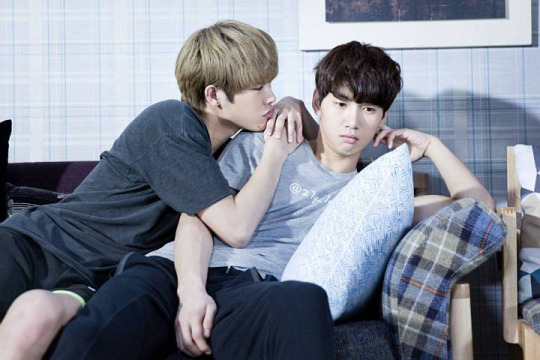
The Story: Different couples live together in an apartment building. The show shows us snippets of their lives. Joon Jae’s life gets turned upside down when he meets his new roommate Takuya.
Should You Watch?: Hmmm...yeah. I started watching this show expecting it would showcase the typical Korean bromance between the guys. The kind where the show makes it seem like the guys might have feelings for each other, but the show just skirts around the topic entirely. In the first few episodes, that’s exactly what happened between Joon Jae and Takuya (with a lot of sex jokes and penis jokes thrown in for good measure. That’s actually what most of the show is). But the show eventually, actually, went there. Joon Jae and Takuya don’t get a whole lot of screen time, but when they do, we get to see some serious feelings thrown in with all the crass humor, and Joon Jae and Takuya do admit to having feelings for one another. The ending could have been a little better, but it was a happy one, so baby steps.
Perseverance Goo Hae Ra: Jang Goon (2015)

The Story: A group of rag tags come together to form a band. Jang Goon joins the band and meets their manager Tae Poong who he’s had a crush on for years.
Should You Watch?: Only if you’re interested in the rest of the show. Jang Goon has a fairly interesting storyline. He has a friend who accepts him after finding out about his crush and he has to rebuild bridges with his father who doesn’t accept him doing music (and Jang Goon’s scared he wont accept his being gay either). But Jang Goon’s storyline is such a small part of the story it wouldn’t be worth it to skip through to only his parts.
Daughters of Club Bilitis (2011)

The Story: A one episode drama detailing the lives of four lesbian couples.
Should You Watch?: I watched this so long ago, I honestly don’t remember a single shred of what happened in it, but I’ll say yes, watch it. Because there are so few lesbians in asian dramas you have to watch the one’s that exist. The entire show is about lesbians, so I mean, why not?
Reply 1997: Jun Hee (2012)
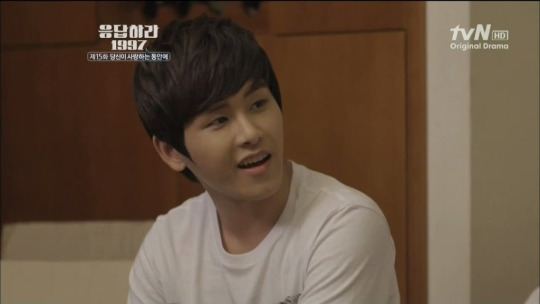
The Story: The lives of a group of high school students in the year1997. Jun Hee has a crush on his friend Yoon Jae.
Should You Watch?: Yes and no. The Reply Series (Reply 97/94/88) are pretty good dramas after all. They’re great for nostalgia, family, friendship, and the like, but if you’re here solely for the gay? Probably not worth the time. Jun Hee’s a side character. We see him crushing on Yoon Jae and he confesses his feelings to Yoon Jae and another friend, but there’s not too much more than that.
Seonam girls high school investigators: Eps 11-12 (2014)
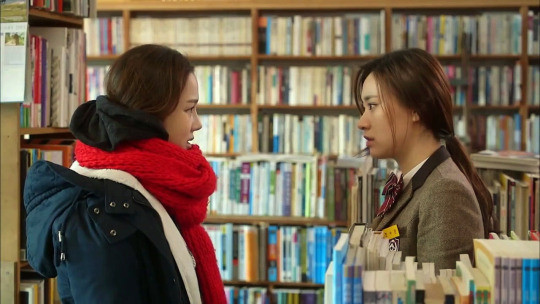
The Story: High School girls investigate and solve problems in their school. The show is episodic and in these two episodes the girls attempt to help Su Yeon and Eun Bin who have to hide their relationship from their classmates.
Should You Watch?: Yes. I honestly don’t remember much about this one either, but I do remember it being decently done. This show caused a lot of controversy years ago when it aired Korea’s first lesbian kiss ( probably korea’s first same sex kiss period that was a legitimate kiss and not used for laughs). It’s worth checking out to see what caused all the ridiculous uproar.
Wise Prison Life/Prison Playbook: Han Yang (2017)

The Story: Big time baseball player Kim Je Hyuk turns into a crimanal overnight. After he’s convicted, he has to face his new life in prison. He meets some interesting people in prison. Among them is the drug addict Han Yang.
Should You Watch?: Yes, because the story itself is a really interesting take about a man who goes to prison, meets a lot of different, people, and ultimately makes new friends/family. If you’re just watching for the gay? I’d still have to say yes, despite the fact that Han Yang doesn’t get the happy ending he deserved. Han Yang was one of my favorite characters in this show. I don’t know how he managed it, but I swear Han Yang got funnier as the episodes passed. I was really endeared towards him attempting to kick his drug habit while also trying to salvage his relationship with his ex-boyfriend Ji Won. He had such an interesting story arc, was such an entertaining character, and I didn’t feel like the show ever made fun of him for being gay. This character was just such a joy to watch, I definitely don’t regret watching, even though I wanted more.
Moment at Eighteen: Jung Oh Je (2019)
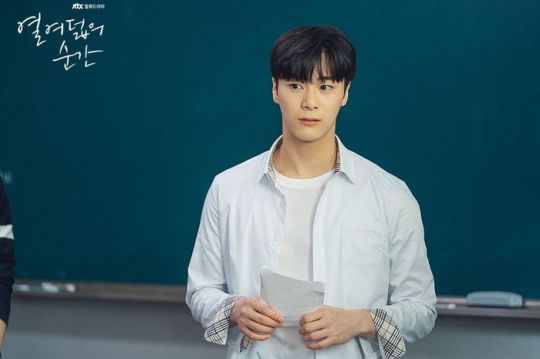
The Story: Transfer student Jun Woo has no interest in school life, as he is traumatized from being expelled from bullying. Meanwhile, Soo Bin has been watching Jun Woo all this time. She sees a different side to Jun Woo than the one that other people see. Oh Je, is Jun Woo’s best friend who starts to discover his sexuality.
Should you watch?: Hmmm… sure. Oh Je has a decent side plot. It was interesting to see him figuring out he liked Hwi Young and coming out to his ex girlfriend and his friends. I do wish his story was expanded a little more though. There were several things I would have liked to have seen, like coming out to his family, and I thought they wrapped his story up a little too quickly at the end.
Love with Flaws: Won Suk and Ho Dol (2019)
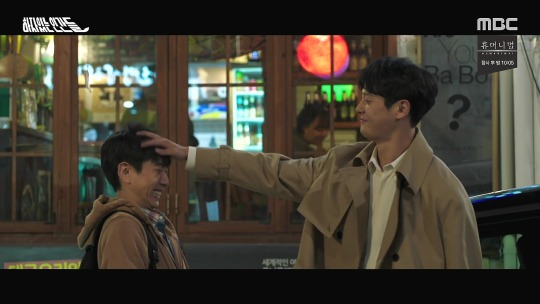
The Story: Joo Seo Yeon, is a hot-tempered physical education high school teacher who always wears sneakers, jeans and training uniforms. The death of her parents helped instill a deep sense of compassion, a generous heart and an outspoken objection for anyone who drinks and drives. Living in a house with three wild and very attractive brothers, she loathes flower boys. Her ideal type is someone who is “not handsome.” Won Suk is one of her handsome older brothers.
Won Suk has closed his heart to relationships and love, but he lives his life as an openly gay man. Ho Dol is closeted and lacks confidence. They meet one night at Won Suk’s bar.
Should you watch?: People have been kind enough to condense Won Suk’s and Ho Dol’s story into parts on YouTube so yeah, go ahead and check it out.
These two don’t get a whole lot of screen time, but the little they do get is nice. We get to see Won Seok help Ho Dol open up and be more confident with who he is and in turn, Won Seok opens up his heart.
The Bad (you probably shouldn’t waste your time on these ones)
Personal Taste: Director Choi (2010)

The Story: This dramas about a straight guy who pretends to be gay in order to gain access to the blueprints of a woman’s house…or something like that. Director Choi’s specific story revolves around his attempts at courting that guy.
Should You Watch?: Absolutely not. Half of the time the drama equates being a gay man to automatically being feminine, a woman, or not a “real man”. Director Choi is also a good deal older than the male lead and makes several attempts at courting him even though he’s not interested. It kind of came off as the “creepy old gay perv” and that didn’t sit well with me. I suppose you could skim through the drama to watch Director Choi’s scenes. If sad gay men Is your thing. I just felt bad for the guy most of the time.
Ho Gu’s Love: Kang Chul (2015)
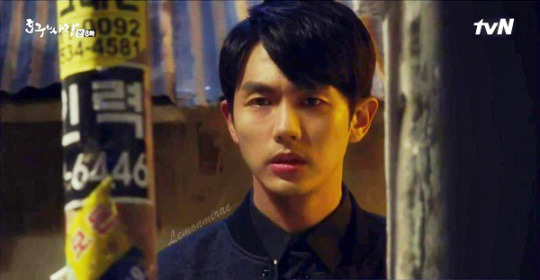
The Story: Ho Gu’s a pushover, a fool, and kind of an idiot. He meets his old classmates and things get a complicated. One day in High School Kang Chul meets Ho Gu’s twin sister and mistakes her for Ho Gu. They spend the day together and she kisses him. The kiss sparks feelings in Kang Chul. Of course Kang Chul thinks it was Ho Gu who kissed him and years later, when he meets Ho Gu his feelings grow stronger.
Should You Watch?: Yes? Maybe? If you really want to, but mostly…no. With this, I expected that the typical drama set up would happen. Similar to all gender benders, Kang Chul would find out that it wasn’t Ho Gu he kissed. So any feelings he was having for him would immediately get swept under the rug where we could all pretend we never knew his heart fluttered for another man. Imagine my surprise when episode after episode passed and that didn’t happen. We got down to the last few episodes and Kang Chul had admitted to himself that he liked Ho Gu, he came out to his parents, and his coworkers assumed he was gay. The show was actually depicting the struggles of being gay in Korea and it was arguably one of the better storylines for a gay character on Korean t.v., but then the show couldn’t stay strong and they flipped the script. Predictably, Kang Chul finds out it was Ho Gu’s sister he kissed, the show copped out, and lo and behold Kang Chul was straight with no further mentions of any other possible sexuality. Watch it if you’re curious, but be prepared to be extremely disappointed by the end.
Graceful Family: Mo Wan Joon (2019)
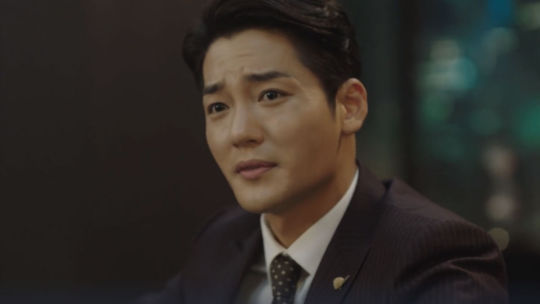
The Story: Blah blah blah, revenge or something- at a point it’s revealed that Mo Wan Joon is a trans woman.
Should you watch?: If you really like revenge melos maybe, but if you’re looking for this show to do something good and offer up some good trans rep? Nope.
Literally nothing about Mo Wan Joon’s story is watchable. I wasn’t even entirely sure the show even knows what being transgender even means. It comes off as more of a plot twist to put the family all in a tizzy more than anything else. They don’t really show much of Wan Joon’s struggle or anything poignant or engaging.
Sweet Munchies: Tae Wan (2020)
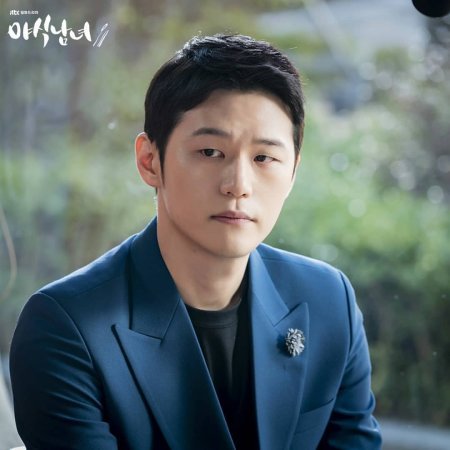
The Story: Jin Sung pretends to be a gay chef to film a tv show for money. Tae Hwan, a closeted fashion designer falls for him.
Should you watch?: No. "Everyone loved Personal Taste right? What if we just did that again but with a chef this time?" This could have been potentially groundbreaking, but by the end of the show the two leads are unlikable and we just wind up with more sad gay tears. But Lee Hak Joo as Tae Wan? *Chef's kiss*. This man put me through the wringer and he does it so subtly. If you must watch, literally skim through Tae Wan’s parts.
The Good (these are worth the hours of your life you wont get back)
Painter of the Wind (2008)

The Story: Shin Yoon Bok is a talented painter who disguises herself as a boy to search for her father's murderer and meets a master painter who guides her into being a great painter. Kim Hong Do is the man who teaches Yoon Bok how to paint, and they develop a strong friendship of mentor and disciple.
Should You Watch?: Yes. On the surface this sounds pretty straight, but ignore the summary, because yes there’s a loveline between Yoon Bok and her mentor, but the most interesting story here is the loveline between Yoon Bok and a Gisaeng she meets named Jeong Hyang I’ve seen plenty of gender benders, but I’ve never seen one where a woman falls in love with the girl who’s pretending to be a boy. This drama isn’t technically supposed to be gay, but it’s extremely gay when when bisexual Yoon Bok hits on the gisaeng the first time they meet. Yoon Bok finds herself falling in love with the Jeong Hyang too and the love between them comes off as extremely genuine and sincere. I don’t care what that show was trying to tell me, Yoon Bok/Jeong Hyang was the true otp.
Life is Beautiful: Tae Sub and Kyung Soo (2010)
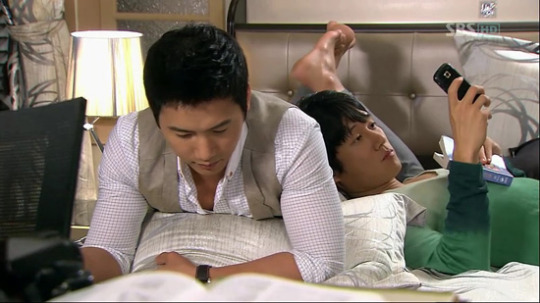
The Story: A family drama about a blended family. The show focuses heavily on Tae Sub and his boyfriend Kyung Soo
Should You Watch?: Absolutely. In this drama we actually get to see a same sex couple. There’s not just one gay character or a situation where you have to read between the lines. Tae Sub and Kyung Soo are a gay couple who get to be together and happy and they get screentime! The show focuses on Tae Sub coming out to his family, his family's acceptance/non-acceptance, and Kyungsoo’s family’s non-acceptance as well. We get to see the guys work through their problems together and we get to see how they’re relationship changes and grows. My only complaint about this show is that it aired seven years ago and korea has shown little to no progress in terms of lgbt characters and couples in kdramas since.
Rural Outcasts (2019)
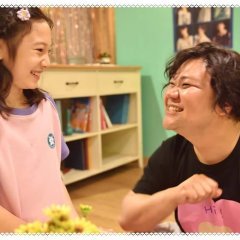
The Story: Sun Hui moves to a small village where she lives her life as Soon Ho until she can make enough money to become her true self. Dong Ja, a feisty 12 year old, breaks into her house one day.
Should you watch? Yes, although, heads up, there’s a cis man playing a trans woman. Found family always makes for a heartwarming story and this one is no different. I loved the bond between Dong Ja and Sun Hui and I loved their mother daughter relationship. Very sweet and heartwarming, but be prepared for some heartbreak too.
#gay characters in kdramas#korean#drama#life is beautiful#painter of the wind#ho gus love#personal taste#perseverance goo hae ra#daughters of club bilitis#seonam girls high school investigators#reply 1997#the lover#lily fever#lgbt#wise prison life#prison playbook#love with flaws#moment at 18
2K notes
·
View notes
Link
Jordan Michael Smith | Longreads | May 2019 | 10 minutes (2,744 words)
If someone spits bigotry at you while you’re a kid, you’re unlikely to forget it. You’ll remember it not because it’s traumatic, though it can be. You’ll remember it not even because it’s degrading and excruciating, though it is certainly those things, too. No, you’ll remember it because it instills in you an understanding that people are capable of motiveless evil. That humans can be moved to hate because they are hateful. You aren’t given a reason for why people hate you, because they don’t need a reason. You’re you, through no fault of your own, even if you want desperately to be anyone else. And that’s enough.
I am a Canadian. I was born in Markham, which is a small city about 30 kilometers northeast of Toronto. That distance meant a great deal. Markham was a large town of middle- and working-class families when my newlywed parents moved there, in the late 1970s, with a population that hovered around 60,000. It was pretty mixed demographically, I recall, though containing a white majority. My older sister and I were the only Jews in our elementary school, except for one other family who arrived after we did and seemed not to attract much ire; I imagined it was because they were beautiful and popular (we were neither).
We were one of the minority of Canadian Jewish families living outside Toronto or Montreal. More than 71% of all Canadian Jews reside in these two cities, according to Allan Levine’s serviceable but unexceptional new book on the history of Jewish Canada, Seeking the Fabled City. Levine describes a familiar story of an immigrant group gradually gaining acceptance (and some power) in a once-largely white Christian country. For the first half of the 20th century, Jews in Canada were arguably detested to a greater degree than in America. By the 21st century, Canadian Jews felt as safe as Jews anywhere felt safe. Levine quotes a Toronto rabbi as saying, “Living in Toronto, my children don’t know that Jews are a minority.”
Local Bookstores
Amazon
I always knew. I knew it when my grade five teacher encouraged me to sing along with the Christmas Carols, mouthing the words about how greatly I loved Christ, the Lord. I wrote an essay about how I hated Christmas because I felt left out — but when the teacher, annoyed, asked me if I actually felt that way, I lacked the courage to affirm that I did.
That was what might be called casual antisemitism, deniable to its practitioners because of its thoughtlessness. It can be distinguished from other varieties of antisemitism, which are less casual and more menacing. Such as the kid — the most popular in my grade, who I badly wanted as a friend — who told me that I looked Jewish because I had a big nose. Such as the kid who used permanent marker to brand the word ‘JEW’ on my sister’s knapsack in giant black lettering. Such as the kid who teased my sister for being Jewish so intensely that my family left Markham when I was in grade eight.
I’d like to look back satisfied at having reacted to these incidents with righteous anger. In the School Ties version of my life, I confront every single kid who hissed antisemitism at me, beating up the boys and browbeating the girls. Maybe I confront their parents — in the pre-internet era, they likely learned their precocious bigotry at home — and beat them up, too. My grandfather beat up his antisemitic childhood tormentor, my father used to tell me proudly. In high school, one of my friends attacked a kid who called him a dirty Jew when they were playing hockey, and my Dad always congratulated my friend, for years after.
But what I remember feeling on those occasions in Markham was not anger but fear. That emotion infused a few crucial years in my adolescence, and it’s one that singularly hinders heroism. Fear cripples action and encourages paralysis. So I reacted to jokes and slurs by laughing along — I actually once brought a yarmulke to class and paraded it around on my head to the amusement of my social betters, like a dancing Russian bear — or by pretending I didn’t mind while I panicked internally.
One of the awful things about oppression is that sometimes you can’t bring yourself to hate your oppressors. You want them to like you too badly.
Experiencing bigotry can instill a morbid curiosity about the perspective of one’s oppressors. At some point, in grade six or seven, I started wondering why my school chums despised my Jewishness. Or, perhaps it wasn’t that intentional; maybe I simply became enthralled with the Holocaust at the same time I faced antisemitism at school.
I fixated on the swastika, the symmetrical right angles hypnotizing me. I drew them on notebooks and spots where my parents wouldn’t see. In a remarkable feat for a 13-year-old, I read William L. Shirer’s mammoth The Rise and Fall of the Third Reich, as well as a book on Auschwitz and a biography of Josef Mengele, the Nazi doctor. I didn’t feel strong emotions reading about the Holocaust, no eruptions of horror or sadness. It was just fascinating to me, the way an unfamiliar animal can seem fascinating. Skinheads, the frightening antisemitic menace at the time, were attractively dangerous. I remember thinking that I’d be a neo-Nazi if I could. They were tough and feared, and I was weak and scared.
Something else was happening to me that became apparent only later on. In his excellent new book on the myth of Judeo-Bolshevism, A Specter Haunting Europe, Paul Hanebrink writes about how the Holocaust became the primary moral tale for the contemporary Western world. The unique nature of genocide “made the Holocaust a paradigmatic case of evil, and charged Holocaust memory with implications for the teaching of toleration in a modern multicultural and liberal society,” writes Hanebrink, a historian at Rutgers University. The Holocaust wasn’t just something else to learn about it. It offered clear, imperishable moral lessons that could sustain me. I had evidence, if I needed it, that my Jewishness was innocent, and my persecutors were guilty of … something. And that those distinctions mattered.
Local Bookstores
Amazon
The problem was that I lacked internal strength. I had convictions, but they gave me no courage. Even if I was convinced I was undeserving of discriminatory treatment, I was too unsure of the other parts of me to act. And so I didn’t. Not when I sat during recess against the brick walls of the school and two boys turned the corner to toss pennies at me. Not when two other boys directed Hitler salutes at me. Not when one of those kids drew a swastika on his pencil box and the principal happened to see it and ineffectually told him to erase it and walked off. Not even then.
I suppose I did have one conviction — I wanted to be popular. Popular kids seemed to have more fun and get more respect. And so, even while I burned at the Jew-hatred thrown my way, I wanted to be friends with the flamethrowers. The next few years I invested heavily in ingratiating myself with the same kids who heaved pennies and Hitler salutes at me. One of the awful things about oppression is that sometimes you can’t bring yourself to hate your oppressors. You want them to like you too badly.
Hanebrink’s book gestures at this without quite making the connection. A Specter Haunting Europe is about the once-widespread theory that Jews were imposing communism on Europeans as a way to destroy the continent. In our era, conspiracies about Jews normally involve them trying to extinguish the white race, using Zionism to poison humankind, or just running the financial system to their own benefit.
But Hanebrink recalls a time — beginning at the end of World War I, culminating in the Holocaust and surviving into the 1980s — when the primary threat from the Jews was thought to be communist. “Over the course of the twentieth century, the belief that communism was created by a Jewish conspiracy and that Jews were therefore to blame for the crimes committed by communist regimes became a core element of counterrevolutionary, antidemocratic, and racist ideologies in many different countries,” he writes. That belief was crucial to Hitler’s worldview, and to some postwar conservative anti-communists, as well.
Several factors combined to smother the myth of Judeo-Bolshevism. The Holocaust’s penetration into mass consciousness offered lessons about where conspiracy theories could ultimately lead. The rise of human rights as an ethical system for understanding the world gained popular appeal. And the demise of the Soviet Union meant the danger posed by communism was pretty obsolete anyway.
Kickstart your weekend reading by getting the week’s best Longreads delivered to your inbox every Friday afternoon.
Sign up
But conspiracies about shadowy communities didn’t disappear alongside the U.S.S.R. Instead, Hanebrink writes persuasively, a fear of political Islam and terrorism assumed the position in the Western imagination once held by Judeo-Bolshevism. “The figure of the Jewish Bolshevik was imagined as a cunning border crosser who brought a dangerous and foreign ideology to a disloyal and discontented minority,” he writes. Jews then, like Muslims today, were seen as hostile to European traditions, preying on innocent whites. When Donald Trump and Ted Cruz advocate patrolling Muslim-majority neighborhoods in the United States to monitor foreigners, or when states introduce a ban on the implementation of “sharia law”, they are repeating lines read by political actors a century earlier who feared Jewish communists.
Hanebrink situates Islamo-panic in the 21st century. Certainly the 9/11 terrorist attacks inaugurated an era of unprecedented mass hysteria about the threat posed by Muslims. But in the United States, that hysteria actually dates to 1979, when Iranian students captured American diplomats and staffers at the U.S. embassy in Tehran and held them hostage. That event, coupled with the Ayatollah Khomeini’s verbal assaults on America, inspired hostility toward Muslims that has never abated. As early as 1981, the Palestinian-American literary critic Edward Said observed that, “In many instances ‘Islam’ has licensed not only patent inaccuracy but also expressions of unrestrained ethnocentrism, cultural and even racial hatred, deep yet paradoxically free-floating hostility.” The rise of political Islam in Afghanistan, Iran, Palestine, Algeria and elsewhere in the Middle East in the 1980s and 1990s provided further impetus for the fears of Americans and Europeans, as did increased immigration to Western countries by people from the Global South.
It was strategic forgetfulness, acting like I remembered less than I did.
A Specter Haunting Europe notes how Jews morphed from being seen as opposed to Christian civilization to being part of it — to being the bulwark of “Judeo-Christian civilization.” A term regularly invoked primarily but not exclusively among conservatives, “Judeo-Christian” meant in the sense of a shared moral or spiritual sensibility is a fairly recent construct. (The earliest known uses of the term were, utterly predictably, antisemitic.) Instead of invoking Jews as The Other, “Judeo-Christian” integrates them into a White West besieged by alien forces. But it still maintains the paranoid mindset in opposition to foreigners, Muslims, atheists, gay people or feminists. The players are different, but the game is the same. (The sharp-witted gay atheist Jewish former Congressman Barney Frank once memorably quipped, “I’ve never met a Judeo-Christian. What do they look like? What kind of card do you send them in December?”)
The ethos of “Judeo-Christianity” is not something strictly imposed on the Jewish community by outsiders; some Jews participate in the creation of the narrative of the Muslim takeover. In the United States, scholar-activists like Daniel Pipes have been instrumental in spreading fear about Muslims, as have Republican magnates-cum-donors like Sheldon Adelson, activists such as David Horowitz, organizations like the American Israel Public Affairs Committee, and politicians like Joe Lieberman. And Israel has been at the forefront of anti-Islam activism for decades. It is telling that, in Seeking the Fabled City, Allan Levine repeatedly and favorably quotes the Canadian Jewish columnist Barbara Kay, who wrote in the immediate aftermath of the Toronto van attack that it was normal, and in fact commendable, to hope that a Muslim was the perpetrator, because when a Muslim attacks people it is “part of a pattern” that is familiar and legible, but when anyone else does it, it’s just “a random act over which we hadn’t a scintilla of control.” She wrote this even while acknowledging early (and accurate) reports that “sexual grievances” had motivated the killer, who was later reported to be an “incel” inspired by a previous mass murderer who targeted women. That kind of “sexual grievance” is just the product of mental illness, Kay asserted at the time — the work of someone with “addled perceptions”; only if a Muslim had perpetrated the attack would it have been the result of “radicalization” because “jihadists are not insane.” Kay also persistently inflates the danger posed by Islamic fundamentalism and its attendant symbols, like women’s face covering, portraying a fringe practice that should be easily tolerated in a democracy as some kind of existential threat to the body politic. But Levine cites her as “bright and insightful … possess[ing] a sharp and witty sense of humour … she continues to write about the important issues that matter to her with award-winning and always readable columns, while also being the best grandmother she can be.” Segments of the Canadian Jewish community are as hostile to Muslims as their American counterparts are, and Levine thinks they are just good bubbes.
These Jews are part of a community that was — and still is — the target of conspiracy theories alleging their nefariousness. Now they are indulging in their own parallel prejudices. This fact says nothing about Jews or Judaism. But it says something about human beings. About the ease with which victims become victimizers, and the oppressed become oppressors. About my desire to be among my tormentors rather than their mark.
That ambition actually led me to befriend the guys — and they were all guys — who had leveled slurs and coins at me. In grade eight, my final year in Markham, I made a point of ingratiating myself with them. It wasn’t that I forgave them. More that I pretended to forget what they had said and done. It was strategic forgetfulness, acting like I remembered less than I did. It was more convenient that way, for them and me. We all became pals, watching The X-Files, smoking cigarettes and chasing girls together. I never expressed discomfort with their antisemitism, let alone disapproval.
But geography, like time, can change an adolescent’s thinking. When my family emigrated to the predominantly Jewish suburb of Thornhill, it was just a 25-minute drive from Markham but seemed a world apart. After being one of two Jewish families in town, I became one of the few Jews to have spent time in a non-Jewish neighborhood. My status made me more aware of my Judaism, not less. Here it was cool to be Jewish and un-cool to be anything else. Slurs about Jews were out. Jokes about goys were in. My ethnic pride ballooned, and my confidence likewise did as I aged. But for years I continued to have nightmares about my former friends, the only recurring nightmares I’ve ever had.
And yet, with about 25 years’ hindsight since all this went down, what’s striking is how little all of it has affected me. At least consciously, I never thought much about the pennies and the Hitler salutes. Nightmares aside, I never agonized over facing antisemitism, or even got angry about it. I simply filed it away as something else that happened in my childhood, alongside the time someone stole a porn magazine I’d hidden in a tree and the night my friend and I stayed up late to watch as many Friday the 13th installments as we could. I have this weird ability to analyze the events clinically, devoid of emotion, let alone trauma. If I wasn’t over-sensitive about endless other things in my life, I’d be worried about this detachment.
While thinking about writing this piece, I remembered something I hadn’t thought about in decades. When I was in grade two or three, my friend and I leveled a slur at a kid of South Asian descent. I said something terrible to him, using a word whose meaning I didn’t even know — my friend had used the term, and I joined in, wanting as always to be part of a good crowd (an impulse that can make adults into fascists). A teacher explained to me that we had done wrong and made us apologize. A few years later, the kid we bullied and I became friends, too. I wonder if he forgave me, or just strategically forgot about what I’d done. Sometimes kids have to do a lot of forgetting. Sometimes they don’t forget at all.
* * *
Jordan Michael Smith is the author of the Kindle Single, Humanity. His writing has appeared in the New York Times Magazine, the Atlantic, the Washington Post and many other publications.
Editor: Dana Snitzky
0 notes
Text
Christian Schools
Here’s the thing about private Christian Schools.
-I was taught from a young age that the secular world was something to be defended against.
-We were not allowed to watch Finding Nemo for a school movie night because Dory was voiced by a lesbian and our school didn’t want to deal with parental complaints.
-We have the cheesiest, tackiest school song you have EVER heard.
-I have had a math teacher who does not believe women should pursue the maths and sciences. The same math teacher spends, on average, more time lecturing his honors class with variably offensive “devotions” instead of teaching. As a result, the students of this advanced class struggle more than most any other math class in the school.
-I have had a science teacher who gave 20 minute devotions in his 50 minute class. Every. Single. Day. He is a terrible teacher, and he is constantly referring to aesthetic evolutionists as blind and willfully ignorant of the evidence of a creator.
-Harry Potter books are not allowed in the school library due to the complaints of versions parents.
-We have monthly chapels featuring some of the tackiest, most repetitive Christian music you have ever heard.
-We have a teacher who is a total dress code nazi. She stalks the hallways and turns every dress code violation into a spiritual issue wherein girls are trying to seduce the guys at school. Honestly, these are eighth graders who just hit a growth spurt. There just AREN’T any dresses out there that are long enough.
-If an employee’s child drops out or switches schools for any reason (keep in mind, our school is INCREDIBLY driven and demanding on its students), the employee is no longer allowed to keep their job.
-if any student were to get pregnant, I’ve even heard that she would no longer be allowed to stay at school. I can only imagine that similar verdicts would be handed out to any student that came out as LGBTQ.
This is part of my Christian School, and I HATE the fact that any of these bullet points are true.
But this is also my Christian School:
-At the beginning of every year, each member of SGA chooses one or two seventh graders to be their “buddy.” The older buddies make it their job to show the new middle-schoolers the ropes and to encourage their younger buddies. I remember my buddy constantly left me notes and brownies, and always waved to me in the hallway. She’s in college now, but we still stay in touch, even though I was doubtless completely irritating in seventh grade.
-Every single time I see a new kid walking around on orientation night, I always say hi and show them around the school for the rest of the night. They always seem shocked. Is that not something done in public school?
-You never hear hardly any cursing, ever. (This had two different benefits. 1. You learn to save swearing for when it really counts. And yeah, I do think there’s value in this. The less often you swear in everyday speech, the more potent it will be when you use it in fury. 2. You hear the FUNNIEST substitutions for insults.)
-Any time anyone gets bullied or even feels bullied, the administration comes down on the behavior harshly and immediately. I know one girl, new to the school, who was getting teased by a few of my classmates. They weren’t trying to be mean, they just didn’t know her that well and hurt her feelings while joking around and trying to be friendly. She got hand-written letters of apology from all of them.
-The school has never taken any government funding whatsoever. It doesn’t believe it merits any special grant etc. just because it’s a Christian School.
-That terrible science teacher I mentioned? Yeah, he’s an awful teacher. He has one of the biggest hearts I have ever known.
-All of my teachers are fine with me disagreeing with them on philosophy or religion, and I am free to argue with them on any of their statements as long as I do so in a respectful manner. They do not treat or grade me any differently as a student, and do not get angry with me for arguing my beliefs.
-Most of teachers disagree with evolution. However, any time they speak about it, they make an effort to disprove it through facts instead of relying on personal bias.
-Most of the teachers (of course there’s always ONE with a stick up their butt) are really easygoing with a student if they are usually hard-working but slip up on a deadline. I have had one teacher who always talked with his students first about when would be the best time for them to have a paper due. Even that he would change if there was a last-minute project or sports event.
-Our teachers are never afraid of giving us big essays or speeches to read that have bigger ideas behind them. They encourage us to learn on a massive scale and are always stretching our brains.
-The good teachers are CONSTANTLY encouraging us to learn outside of school and formulate our own beliefs. They will also always recommend books and articles to you on any given topic if you want them to.
-That one super-conservative politically right-wing kid in my class makes HUGE efforts to understand things like the values of nature and art and the feminist movement. He’s still conservative, but he never wants to be conservative based off of uneducated bias or prejudice.
-I got the chance to get to know one of the arguably hottest guys in my class this past year. I had never liked him or anything, but I just assumed he was kinda proud, pretty, and flirtatious.
Instead, I met one of the sweetest guys I know. He has two sisters, so he is endlessly patient with women. He’s had a terrible crush on the same girl for years, and they just started dating. He’s always trying to protect, support, and care for her. He’s unendingly humble, always cheers for others, even if they’re not close friends of his, and is always trying to learn new things. He is also constantly searching for truth, reading tough philosophers like C.S. Lewis, Dorothy Sayers, and G.K. Chesterton in the pursuit of figuring out and understanding his Christian faith.
-My best friend is always quiet. She loves with her whole heart, and is one of the most generous people I know. Her hobby is making THOUSANDS of hand-folded paper hearts out of expensive patterned paper she buys herself. She always keeps a jar of these hearts in her locker to give people who are having a bad day, and my entire school loves her.
-lockers never have locks, and we have never had any theft resulting from this rule.
-I have yet to meet a “smart kid” who proudly flaunts their smarts. They’re all humble.
-The teachers (all except the weird 5%) are like family, constantly joking, encouraging, and supporting the students.
-In EARLY middle school, puberty hit me like a truck, and while all the other girls in my class were thin, beautiful, and athletic, I looked like a potato. I never once, ONCE got even slightly teased or even looked at funny because of my appearance.
-Cliques are rare and usually thought of as ridiculous by the rest of the school. Like yeah, there are friend groups, but they intermingle.
-My entire class is athletic. I am not. I sing, I draw, and when I try to play volleyball everyone around me dies a little inside. However, my class has been endlessly encouraging and loving to me despite our differences.
-The people in my school are always trying to do the loving thing for the person beside them. They are always searching for knowledge as humbly as they can. They are always trying to be inclusive, kind, and supportive of others, even if others are different. They never think of themselves as perfect, right, or correct, but are always trying to learn and get better.
So yes, Christian schools can be screwed. They can have weird teachers, policies, and teachings that are completely messed up. But can’t all schools?
Just… please don’t forget that at the heart of some Christian schools there is a deep humility and care for others that can be overshadowed by bad stereotypes.
0 notes
Text
I’ve Done a Lot of Forgetting
Jordan Michael Smith | Longreads | May 2019 | 10 minutes (2,744 words)
If someone spits bigotry at you while you’re a kid, you’re unlikely to forget it. You’ll remember it not because it’s traumatic, though it can be. You’ll remember it not even because it’s degrading and excruciating, though it is certainly those things, too. No, you’ll remember it because it instills in you an understanding that people are capable of motiveless evil. That humans can be moved to hate because they are hateful. You aren’t given a reason for why people hate you, because they don’t need a reason. You’re you, through no fault of your own, even if you want desperately to be anyone else. And that’s enough.
I am a Canadian. I was born in Markham, which is a small city about 30 kilometers northeast of Toronto. That distance meant a great deal. Markham was a large town of middle- and working-class families when my newlywed parents moved there, in the late 1970s, with a population that hovered around 60,000. It was pretty mixed demographically, I recall, though containing a white majority. My older sister and I were the only Jews in our elementary school, except for one other family who arrived after we did and seemed not to attract much ire; I imagined it was because they were beautiful and popular (we were neither).
We were one of the minority of Canadian Jewish families living outside Toronto or Montreal. More than 71% of all Canadian Jews reside in these two cities, according to Allan Levine’s serviceable but unexceptional new book on the history of Jewish Canada, Seeking the Fabled City. Levine describes a familiar story of an immigrant group gradually gaining acceptance (and some power) in a once-largely white Christian country. For the first half of the 20th century, Jews in Canada were arguably detested to a greater degree than in America. By the 21st century, Canadian Jews felt as safe as Jews anywhere felt safe. Levine quotes a Toronto rabbi as saying, “Living in Toronto, my children don’t know that Jews are a minority.”
Local Bookstores
Amazon
I always knew. I knew it when my grade five teacher encouraged me to sing along with the Christmas Carols, mouthing the words about how greatly I loved Christ, the Lord. I wrote an essay about how I hated Christmas because I felt left out — but when the teacher, annoyed, asked me if I actually felt that way, I lacked the courage to affirm that I did.
That was what might be called casual antisemitism, deniable to its practitioners because of its thoughtlessness. It can be distinguished from other varieties of antisemitism, which are less casual and more menacing. Such as the kid — the most popular in my grade, who I badly wanted as a friend — who told me that I looked Jewish because I had a big nose. Such as the kid who used permanent marker to brand the word ‘JEW’ on my sister’s knapsack in giant black lettering. Such as the kid who teased my sister for being Jewish so intensely that my family left Markham when I was in grade eight.
I’d like to look back satisfied at having reacted to these incidents with righteous anger. In the School Ties version of my life, I confront every single kid who hissed antisemitism at me, beating up the boys and browbeating the girls. Maybe I confront their parents — in the pre-internet era, they likely learned their precocious bigotry at home — and beat them up, too. My grandfather beat up his antisemitic childhood tormentor, my father used to tell me proudly. In high school, one of my friends attacked a kid who called him a dirty Jew when they were playing hockey, and my Dad always congratulated my friend, for years after.
But what I remember feeling on those occasions in Markham was not anger but fear. That emotion infused a few crucial years in my adolescence, and it’s one that singularly hinders heroism. Fear cripples action and encourages paralysis. So I reacted to jokes and slurs by laughing along — I actually once brought a yarmulke to class and paraded it around on my head to the amusement of my social betters, like a dancing Russian bear — or by pretending I didn’t mind while I panicked internally.
One of the awful things about oppression is that sometimes you can’t bring yourself to hate your oppressors. You want them to like you too badly.
Experiencing bigotry can instill a morbid curiosity about the perspective of one’s oppressors. At some point, in grade six or seven, I started wondering why my school chums despised my Jewishness. Or, perhaps it wasn’t that intentional; maybe I simply became enthralled with the Holocaust at the same time I faced antisemitism at school.
I fixated on the swastika, the symmetrical right angles hypnotizing me. I drew them on notebooks and spots where my parents wouldn’t see. In a remarkable feat for a 13-year-old, I read William L. Shirer’s mammoth The Rise and Fall of the Third Reich, as well as a book on Auschwitz and a biography of Josef Mengele, the Nazi doctor. I didn’t feel strong emotions reading about the Holocaust, no eruptions of horror or sadness. It was just fascinating to me, the way an unfamiliar animal can seem fascinating. Skinheads, the frightening antisemitic menace at the time, were attractively dangerous. I remember thinking that I’d be a neo-Nazi if I could. They were tough and feared, and I was weak and scared.
Something else was happening to me that became apparent only later on. In his excellent new book on the myth of Judeo-Bolshevism, A Specter Haunting Europe, Paul Hanebrink writes about how the Holocaust became the primary moral tale for the contemporary Western world. The unique nature of genocide “made the Holocaust a paradigmatic case of evil, and charged Holocaust memory with implications for the teaching of toleration in a modern multicultural and liberal society,” writes Hanebrink, a historian at Rutgers University. The Holocaust wasn’t just something else to learn about it. It offered clear, imperishable moral lessons that could sustain me. I had evidence, if I needed it, that my Jewishness was innocent, and my persecutors were guilty of … something. And that those distinctions mattered.
Local Bookstores
Amazon
The problem was that I lacked internal strength. I had convictions, but they gave me no courage. Even if I was convinced I was undeserving of discriminatory treatment, I was too unsure of the other parts of me to act. And so I didn’t. Not when I sat during recess against the brick walls of the school and two boys turned the corner to toss pennies at me. Not when two other boys directed Hitler salutes at me. Not when one of those kids drew a swastika on his pencil box and the principal happened to see it and ineffectually told him to erase it and walked off. Not even then.
I suppose I did have one conviction — I wanted to be popular. Popular kids seemed to have more fun and get more respect. And so, even while I burned at the Jew-hatred thrown my way, I wanted to be friends with the flamethrowers. The next few years I invested heavily in ingratiating myself with the same kids who heaved pennies and Hitler salutes at me. One of the awful things about oppression is that sometimes you can’t bring yourself to hate your oppressors. You want them to like you too badly.
Hanebrink’s book gestures at this without quite making the connection. A Specter Haunting Europe is about the once-widespread theory that Jews were imposing communism on Europeans as a way to destroy the continent. In our era, conspiracies about Jews normally involve them trying to extinguish the white race, using Zionism to poison humankind, or just running the financial system to their own benefit.
But Hanebrink recalls a time — beginning at the end of World War I, culminating in the Holocaust and surviving into the 1980s — when the primary threat from the Jews was thought to be communist. “Over the course of the twentieth century, the belief that communism was created by a Jewish conspiracy and that Jews were therefore to blame for the crimes committed by communist regimes became a core element of counterrevolutionary, antidemocratic, and racist ideologies in many different countries,” he writes. That belief was crucial to Hitler’s worldview, and to some postwar conservative anti-communists, as well.
Several factors combined to smother the myth of Judeo-Bolshevism. The Holocaust’s penetration into mass consciousness offered lessons about where conspiracy theories could ultimately lead. The rise of human rights as an ethical system for understanding the world gained popular appeal. And the demise of the Soviet Union meant the danger posed by communism was pretty obsolete anyway.
Kickstart your weekend reading by getting the week’s best Longreads delivered to your inbox every Friday afternoon.
Sign up
But conspiracies about shadowy communities didn’t disappear alongside the U.S.S.R. Instead, Hanebrink writes persuasively, a fear of political Islam and terrorism assumed the position in the Western imagination once held by Judeo-Bolshevism. “The figure of the Jewish Bolshevik was imagined as a cunning border crosser who brought a dangerous and foreign ideology to a disloyal and discontented minority,” he writes. Jews then, like Muslims today, were seen as hostile to European traditions, preying on innocent whites. When Donald Trump and Ted Cruz advocate patrolling Muslim-majority neighborhoods in the United States to monitor foreigners, or when states introduce a ban on the implementation of “sharia law”, they are repeating lines read by political actors a century earlier who feared Jewish communists.
Hanebrink situates Islamo-panic in the 21st century. Certainly the 9/11 terrorist attacks inaugurated an era of unprecedented mass hysteria about the threat posed by Muslims. But in the United States, that hysteria actually dates to 1979, when Iranian students captured American diplomats and staffers at the U.S. embassy in Tehran and held them hostage. That event, coupled with the Ayatollah Khomeini’s verbal assaults on America, inspired hostility toward Muslims that has never abated. As early as 1981, the Palestinian-American literary critic Edward Said observed that, “In many instances ‘Islam’ has licensed not only patent inaccuracy but also expressions of unrestrained ethnocentrism, cultural and even racial hatred, deep yet paradoxically free-floating hostility.” The rise of political Islam in Afghanistan, Iran, Palestine, Algeria and elsewhere in the Middle East in the 1980s and 1990s provided further impetus for the fears of Americans and Europeans, as did increased immigration to Western countries by people from the Global South.
It was strategic forgetfulness, acting like I remembered less than I did.
A Specter Haunting Europe notes how Jews morphed from being seen as opposed to Christian civilization to being part of it — to being the bulwark of “Judeo-Christian civilization.” A term regularly invoked primarily but not exclusively among conservatives, “Judeo-Christian” meant in the sense of a shared moral or spiritual sensibility is a fairly recent construct. (The earliest known uses of the term were, utterly predictably, antisemitic.) Instead of invoking Jews as The Other, “Judeo-Christian” integrates them into a White West besieged by alien forces. But it still maintains the paranoid mindset in opposition to foreigners, Muslims, atheists, gay people or feminists. The players are different, but the game is the same. (The sharp-witted gay atheist Jewish former Congressman Barney Frank once memorably quipped, “I’ve never met a Judeo-Christian. What do they look like? What kind of card do you send them in December?”)
The ethos of “Judeo-Christianity” is not something strictly imposed on the Jewish community by outsiders; some Jews participate in the creation of the narrative of the Muslim takeover. In the United States, scholar-activists like Daniel Pipes have been instrumental in spreading fear about Muslims, as have Republican magnates-cum-donors like Sheldon Adelson, activists such as David Horowitz, organizations like the American Israel Public Affairs Committee, and politicians like Joe Lieberman. And Israel has been at the forefront of anti-Islam activism for decades. It is telling that, in Seeking the Fabled City, Allan Levine repeatedly and favorably quotes the Canadian Jewish columnist Barbara Kay, who wrote in the immediate aftermath of the Toronto van attack that it was normal, and in fact commendable, to hope that a Muslim was the perpetrator, because when a Muslim attacks people it is “part of a pattern” that is familiar and legible, but when anyone else does it, it’s just “a random act over which we hadn’t a scintilla of control.” She wrote this even while acknowledging early (and accurate) reports that “sexual grievances” had motivated the killer, who was later reported to be an “incel” inspired by a previous mass murderer who targeted women. That kind of “sexual grievance” is just the product of mental illness, Kay asserted at the time — the work of someone with “addled perceptions”; only if a Muslim had perpetrated the attack would it have been the result of “radicalization” because “jihadists are not insane.” Kay also persistently inflates the danger posed by Islamic fundamentalism and its attendant symbols, like women’s face covering, portraying a fringe practice that should be easily tolerated in a democracy as some kind of existential threat to the body politic. But Levine cites her as “bright and insightful … possess[ing] a sharp and witty sense of humour … she continues to write about the important issues that matter to her with award-winning and always readable columns, while also being the best grandmother she can be.” Segments of the Canadian Jewish community are as hostile to Muslims as their American counterparts are, and Levine thinks they are just good bubbes.
These Jews are part of a community that was — and still is — the target of conspiracy theories alleging their nefariousness. Now they are indulging in their own parallel prejudices. This fact says nothing about Jews or Judaism. But it says something about human beings. About the ease with which victims become victimizers, and the oppressed become oppressors. About my desire to be among my tormentors rather than their mark.
That ambition actually led me to befriend the guys — and they were all guys — who had leveled slurs and coins at me. In grade eight, my final year in Markham, I made a point of ingratiating myself with them. It wasn’t that I forgave them. More that I pretended to forget what they had said and done. It was strategic forgetfulness, acting like I remembered less than I did. It was more convenient that way, for them and me. We all became pals, watching The X-Files, smoking cigarettes and chasing girls together. I never expressed discomfort with their antisemitism, let alone disapproval.
But geography, like time, can change an adolescent’s thinking. When my family emigrated to the predominantly Jewish suburb of Thornhill, it was just a 25-minute drive from Markham but seemed a world apart. After being one of two Jewish families in town, I became one of the few Jews to have spent time in a non-Jewish neighborhood. My status made me more aware of my Judaism, not less. Here it was cool to be Jewish and un-cool to be anything else. Slurs about Jews were out. Jokes about goys were in. My ethnic pride ballooned, and my confidence likewise did as I aged. But for years I continued to have nightmares about my former friends, the only recurring nightmares I’ve ever had.
And yet, with about 25 years’ hindsight since all this went down, what’s striking is how little all of it has affected me. At least consciously, I never thought much about the pennies and the Hitler salutes. Nightmares aside, I never agonized over facing antisemitism, or even got angry about it. I simply filed it away as something else that happened in my childhood, alongside the time someone stole a porn magazine I’d hidden in a tree and the night my friend and I stayed up late to watch as many Friday the 13th installments as we could. I have this weird ability to analyze the events clinically, devoid of emotion, let alone trauma. If I wasn’t over-sensitive about endless other things in my life, I’d be worried about this detachment.
While thinking about writing this piece, I remembered something I hadn’t thought about in decades. When I was in grade two or three, my friend and I leveled a slur at a kid of South Asian descent. I said something terrible to him, using a word whose meaning I didn’t even know — my friend had used the term, and I joined in, wanting as always to be part of a good crowd (an impulse that can make adults into fascists). A teacher explained to me that we had done wrong and made us apologize. A few years later, the kid we bullied and I became friends, too. I wonder if he forgave me, or just strategically forgot about what I’d done. Sometimes kids have to do a lot of forgetting. Sometimes they don’t forget at all.
* * *
Jordan Michael Smith is the author of the Kindle Single, Humanity. His writing has appeared in the New York Times Magazine, the Atlantic, the Washington Post and many other publications.
Editor: Dana Snitzky
from Blogger http://bit.ly/2Mlcu6U
via IFTTT
0 notes